#STCGodot Ends London Run (Incl Hugo Weaving Fan Pics), Strangerland, Between a Frock & A Hard Place
Waiting For Godot Ends London Run
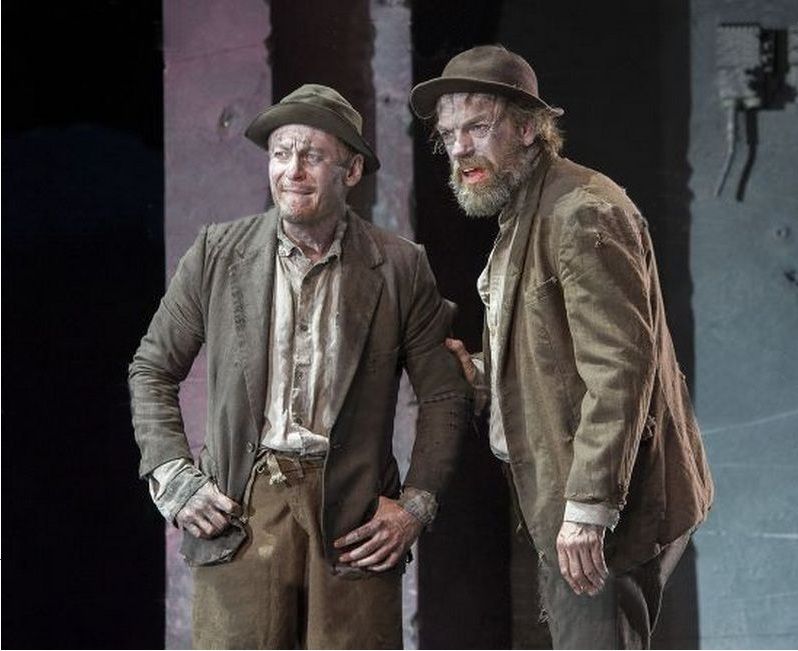
Richard Roxburgh and Hugo Weaving in Sydney Theatre Co's Waiting For Godot, London Barbican production Photo: Alastair Muir/Rex
Sydney Theatre Company's Waiting For Godot, starring Hugo Weaving, Richard Roxburgh, Philip Quast and Luke Mullins, ended its widely-heralded run at London's Barbican on June 13, but accolades and wonderful new photos (many from fans who attended performances) continue to appear. I'll repost as many as I can here, with links back to original sources in case I've missed anything. In the case of fan photos, I'll include their original captions. Most of the reviews of the production were quoted in my previous entries, but I'll add any new ones between photos; the actors were universally praised, though a few critics found the production didn't completely jibe with their interpretation of Beckett. (Some had a very elitist tone that implied anything which might appeal to a mass audience somehow misinterpreted the playwright's intentions... as if he intended for a play about the existential despair of two tramps to appeal to only wealthy academic poseurs who reflexively quote Aristotle's Poetics.) ;)
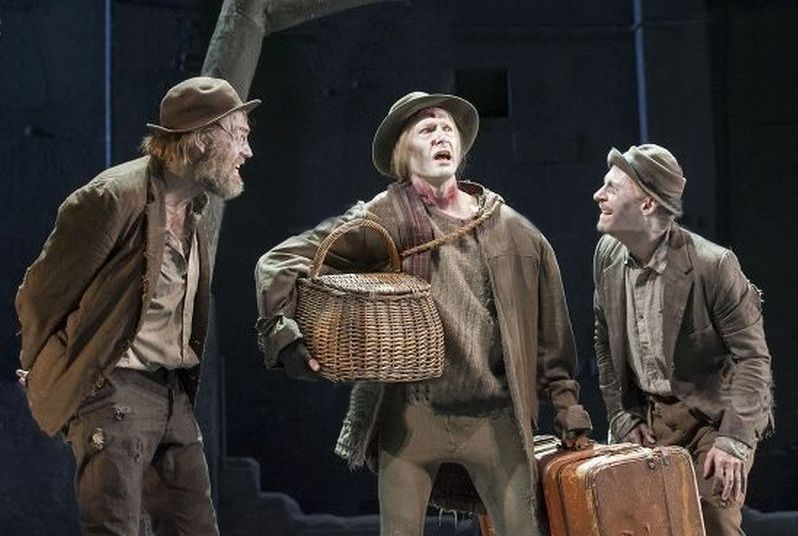
Hugo Weaving, Luke Mullins and Richard Roxburgh in #STCGodot Photo: Alastair Muir/Rex (plus next four)
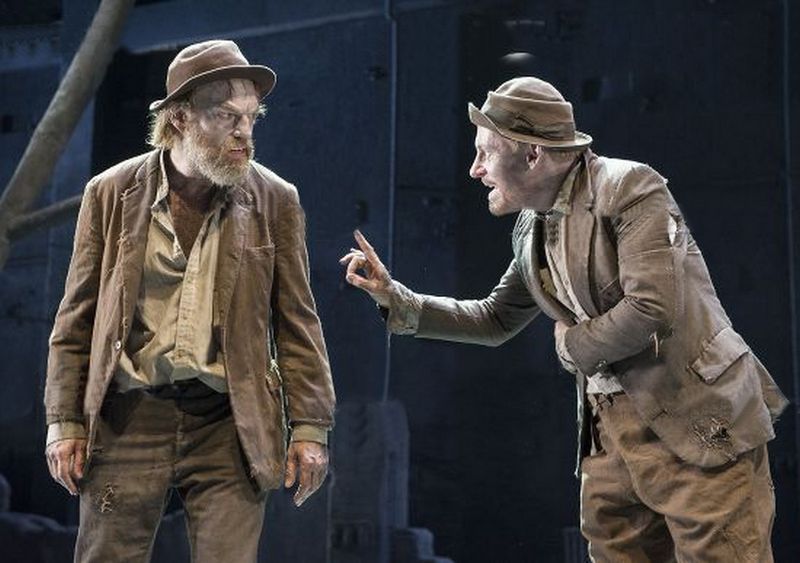

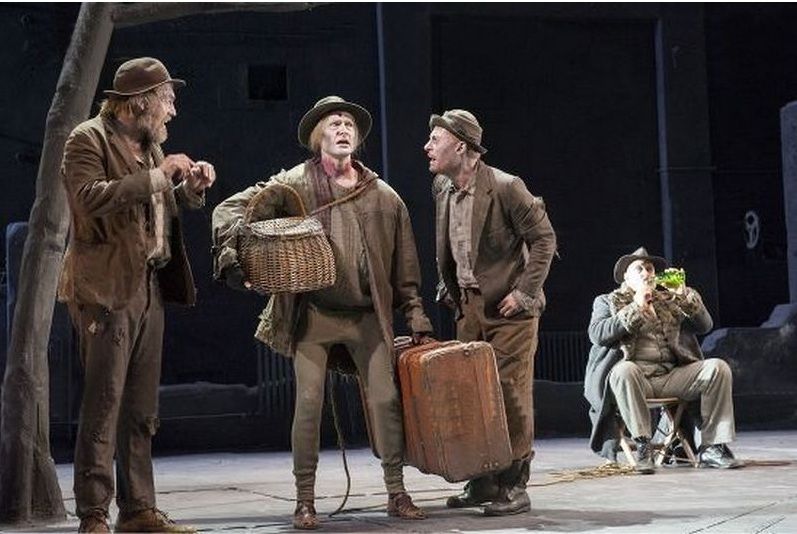
Hugo Weaving, Luke Mullins, Richsrd Roxburgh and Philip Quast
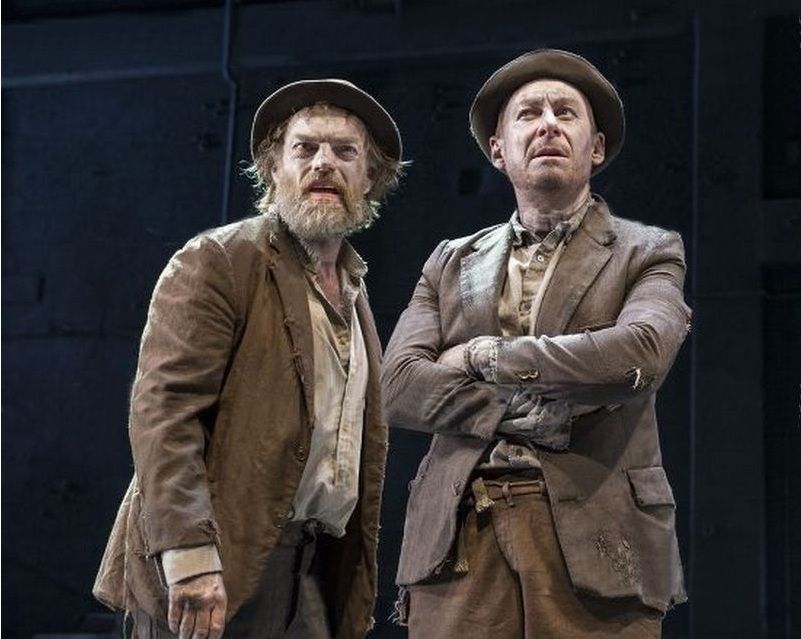
Terry Eastham, Londontheatre1.com: "Going to be really honest now. When I left the opulence of the Barbican’s theatre I was genuinely confused as to what I had just seen. There is no doubting that the production itself is superb. The magnificent Barbican stage seems to be small and very intimate thanks to Andrew Upton’s staging and Nick Schleiper’s excellent lighting of the post-apocalyptic looking set brilliantly created by Zsolt Khell. And the acting itself cannot be faulted. Hugo Weaving and Richard Roxburgh extract every ounce of personality from Vladimir and Estragon, being so comfortable with each other that even the silences between the characters don’t seem forced or wrong but the sort of silence that good friends can have without feeling the need to fill the vacuum with some fatuous comment...
So, nothing to fault on the production but I really wasn’t sure about the ultimate meaning of the play which, I have to say left me feeling frustrated and unfulfilled. Doing some research today, apparently I am not alone in this. Every nuance of the play is open to interpretation by the audience and this really is a show where every single person watching will have their own highly individual view of the message of the show. Heading home, my companions and I came up with separate interpretations involving dead people, blind dates, wormholes through space and a whole host of others...
Ultimately then, “Waiting for Godot” is an amazing production that three hours after the lights first go down will leave you scratching your head and thinking about it for a long, long time to come.
5 Star Rating"
[CJ: Personally, I find ambiguity and "head-scratching" to be a good thing. Thinking about a play over days-- or even years-- keeps it vital in a way that a pro-forma production that can easily be described in a sentence might not. Fairly certain Beckett wasn't thinking about wormholes, though...] ;)

"Hugo Weaving #hugoweaving #waitingforgodot" Momeetsstars, via Instagram
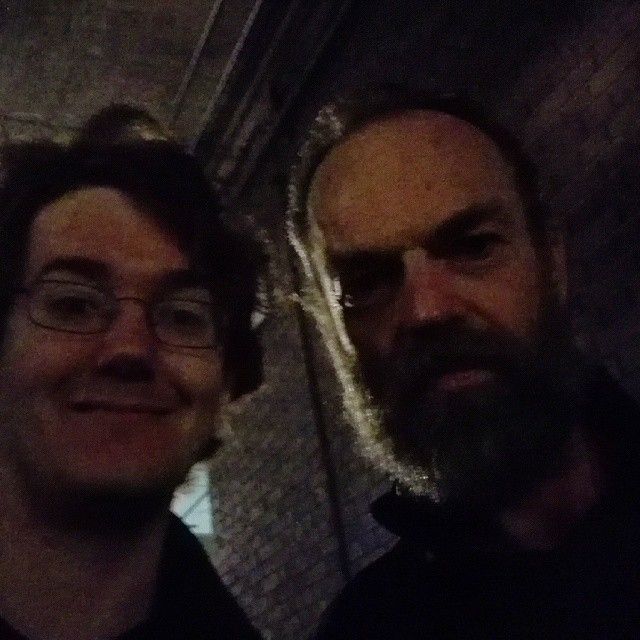
"Not the best photo ever, but I'm happy with it. #stagedooring #hugoweaving #waitingforgodot" Hein, via Instagram
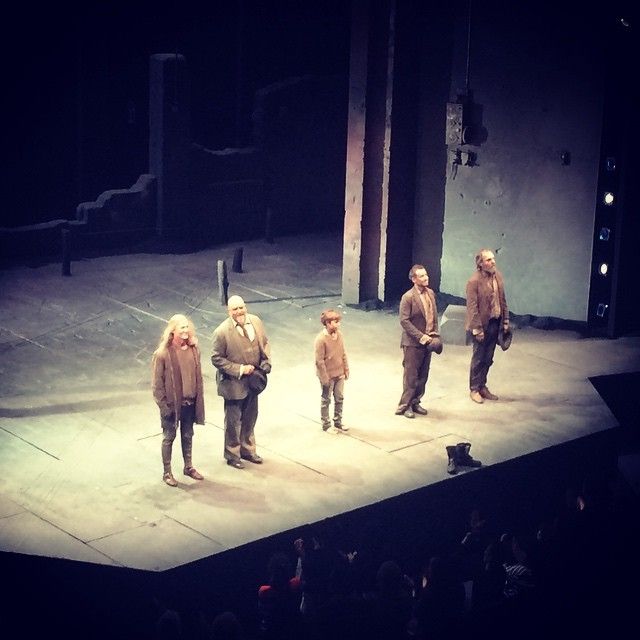
"Waiting for Godot. Utterly moving every single time. And starring Elrond as Vladimir, and Javert as Pozzo? BEYOND WORDS. #WaitingForGodot #theater #London #HugoWeaving" ecaterinaaa via Instagram

"And then it's night once more. Adieuuuuuuu #Vladimir & #Estragon & #Pozzo & #Lucky #STCGodot #STCOnTour" Lauren Dodds via Instsagram/Twitter
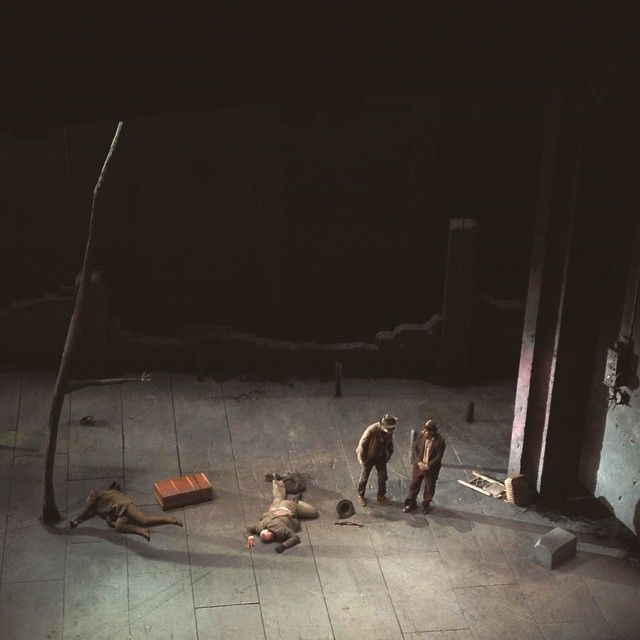
"#SamuelBeckett's beautiful #minimal seminal #postmodern #existential and #absurd #play #WaitingforGodot at #Barbican #theater with #HugoWeaving #playdate @daliakra @joe_robots" Elaine via Instagram
Limelight Magazine and Absolute Theatre include more of those Review Roundups.
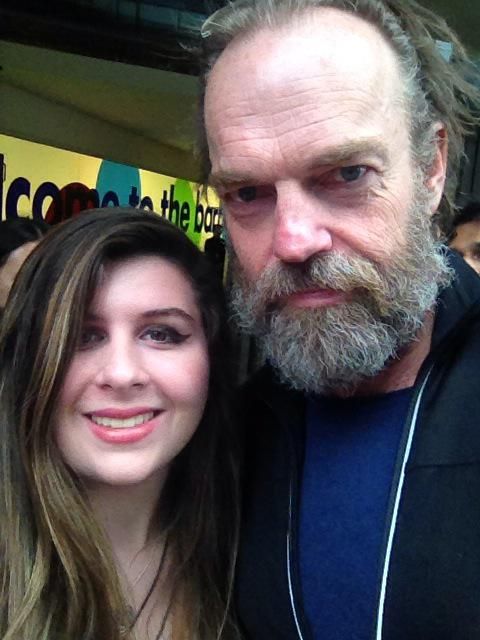
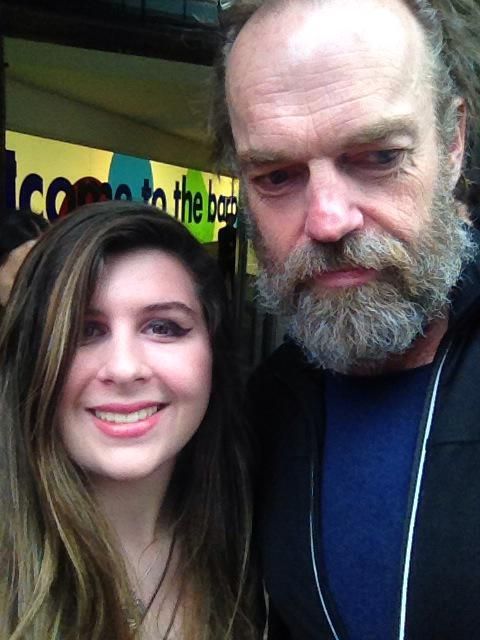
"HUGO WEAVING!! I'M SHAKING AND CRYING!!!!" Elise via Twitter (both photos)
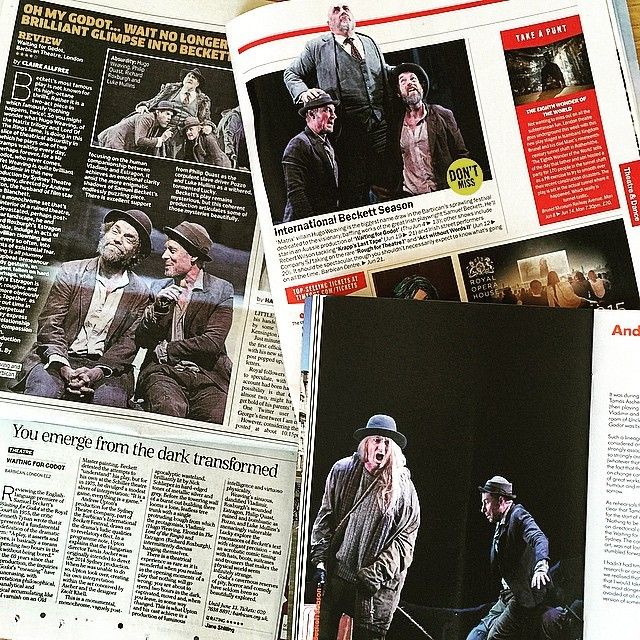
"#stcontour" Tim McKeough via Instagram
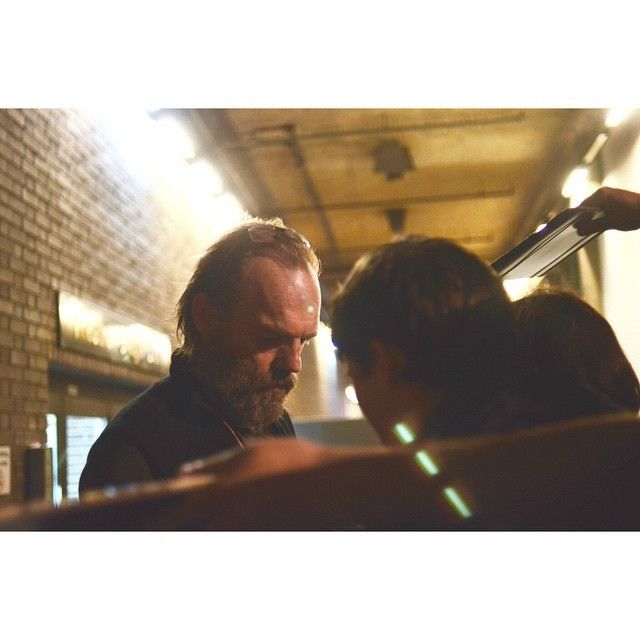
"brilliant and amazing show #hugoweaving #waitingforgodot" Sarah Chen via Instagram
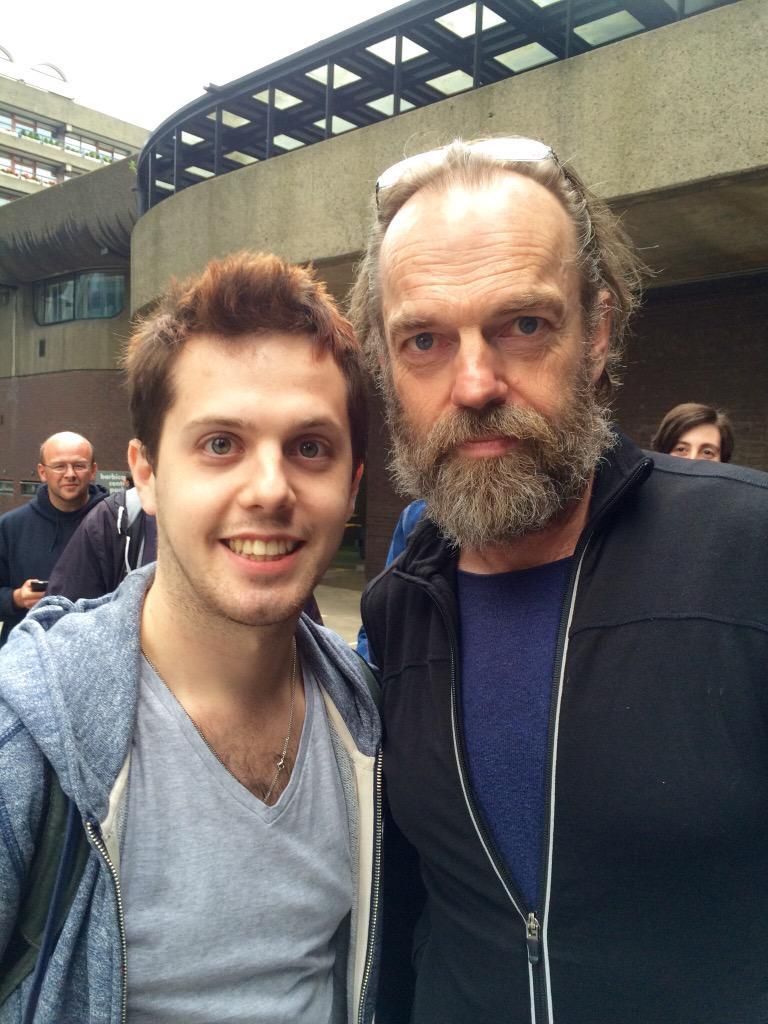
"Met Hugo Weaving and Richard Roxburgh after their incredible performance of Waiting for Godot at the Barbican!" Marcus Higgins via Twitter
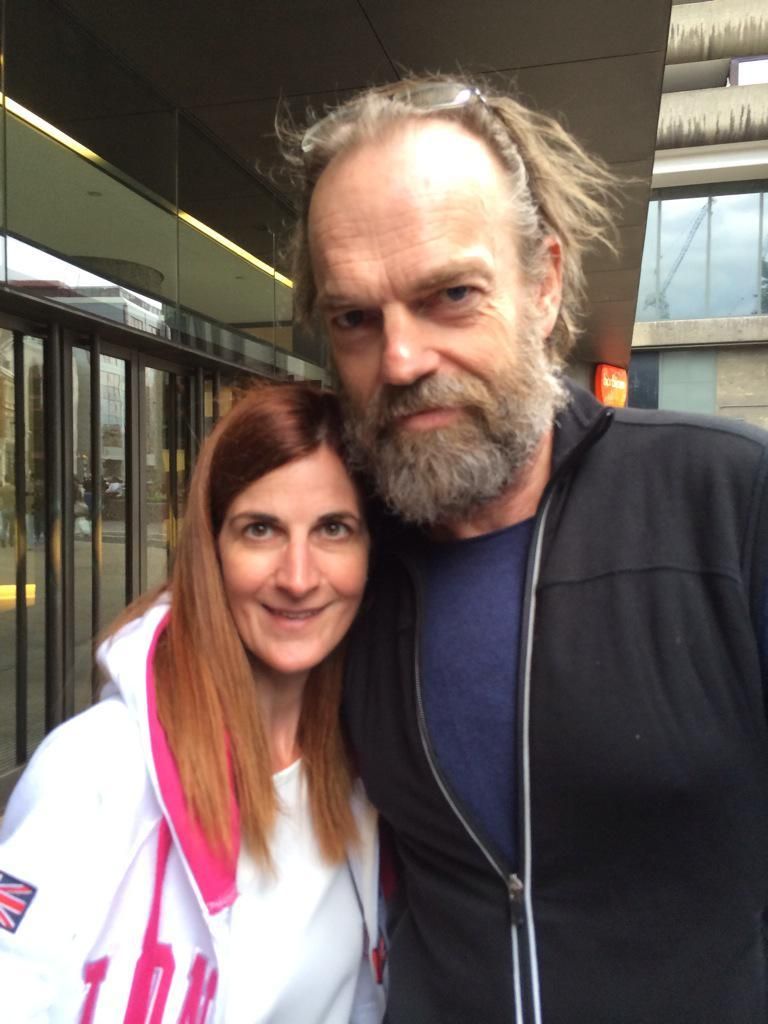
"Me and Hugo Weaving, London,💜💜 aftrernoon. Exeptionnel" Sandrine Destraz via Twitter (plus next two photos)
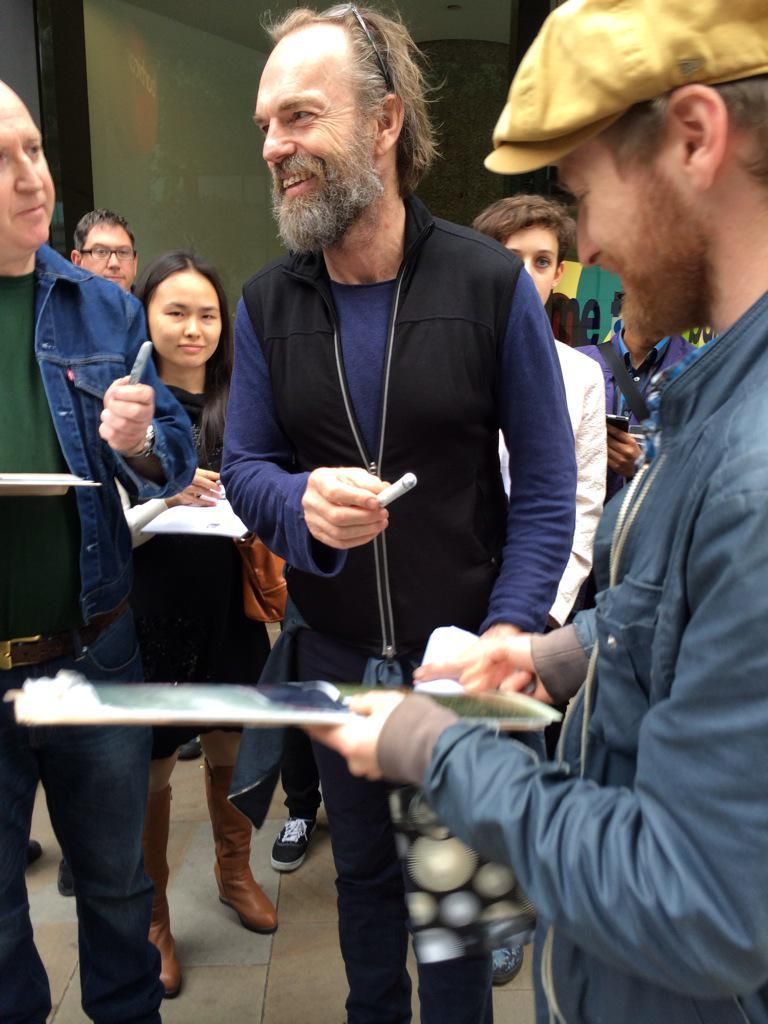
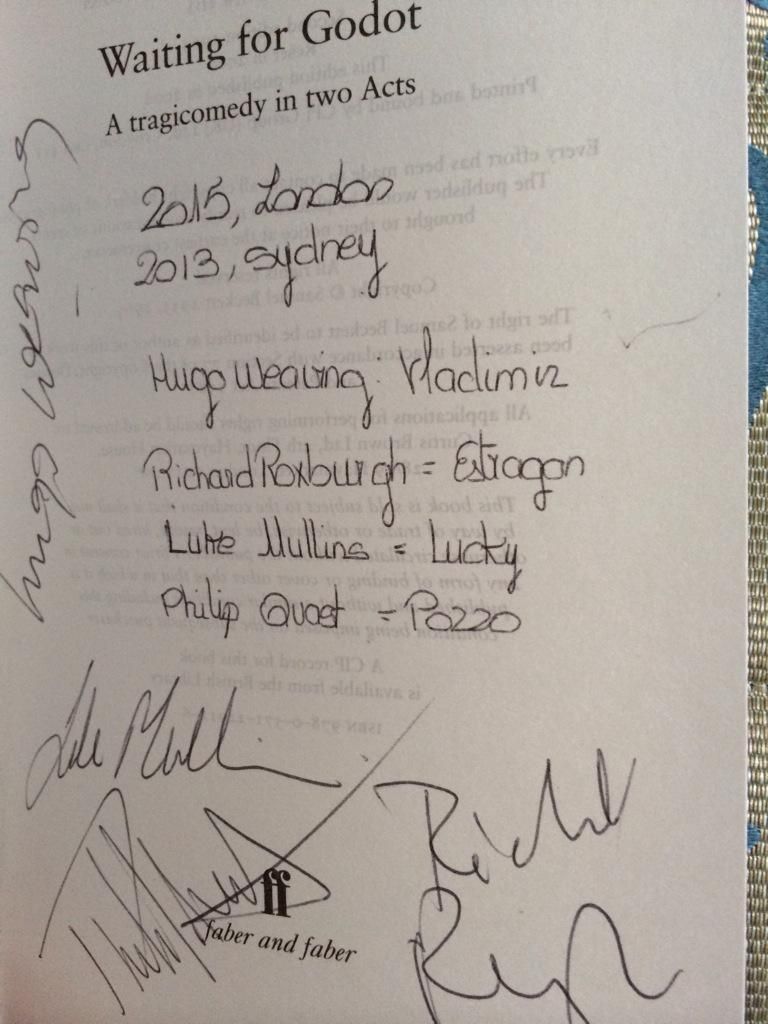
Artist Mark Winter describes his efforts to have Hugo sign two of his sketches featuring the full cast and Hugo solo at ChicanePictures. These are amazing work (see below), probably as good as Nicholas Harding's rehearsal sketches, though of course done without the benefit of Harding's access. ;) I addressed the whole controversy about autographs and why Hugo might sometimes abbreviate his in the extended tangent below, but I do think it all comes down to timing; Hugo regularly waits until the last minute to enter the theatre and often tries to evade autograph seekers entirely when there are large crowds. He also routinely abbreviates when doing group signings (as at Comic Con in 2010-- an event he has said he didn't particularly enjoy-- or film premieres, which he tends to enjoy in inverse proportion to the size of the crowd and the scale of the film. ;) ). I've gotten full signatures when there weren't as many people around; Hugo tends to be more relaxed and willing to converse or pose then.
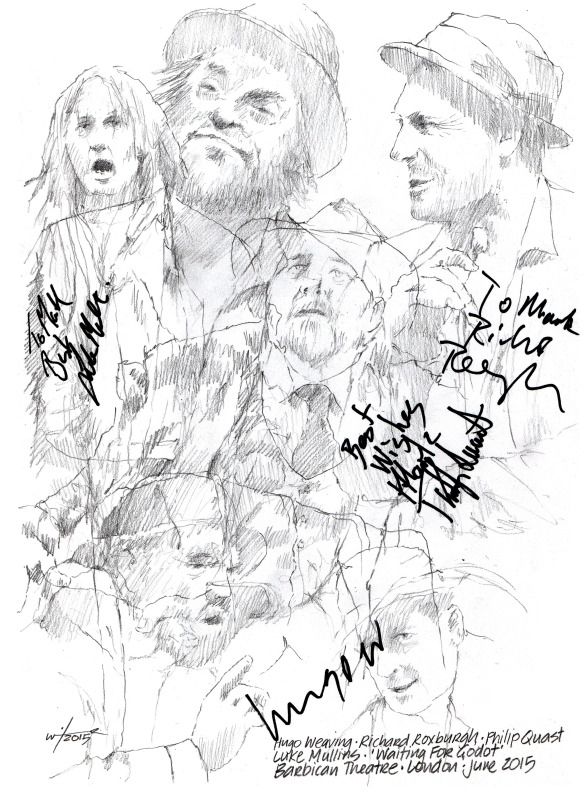
Sketch, the Godot cast and their autographs. Mark Winter via Twitter
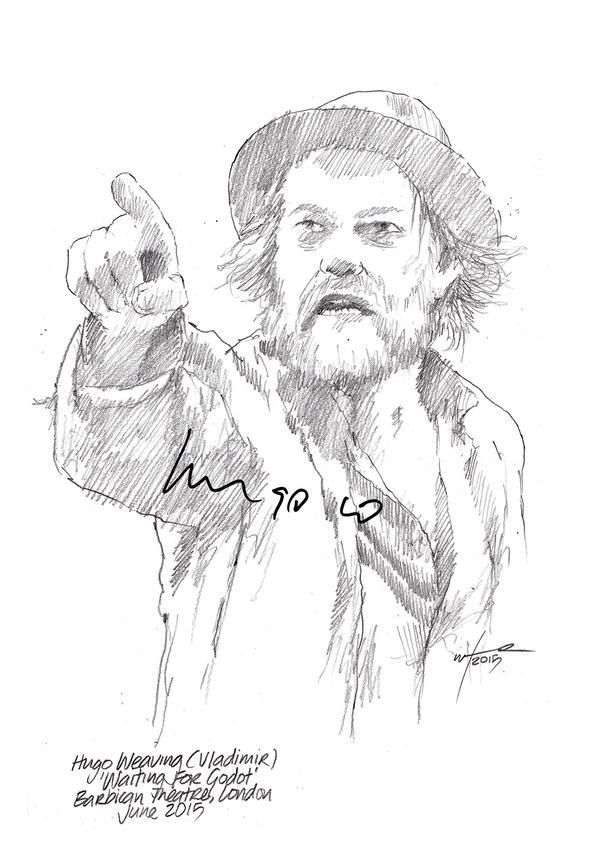
Hugo Weaving as Vladimir in Waiting For Godot plus autograph Mark Winter sketch, via Twitter
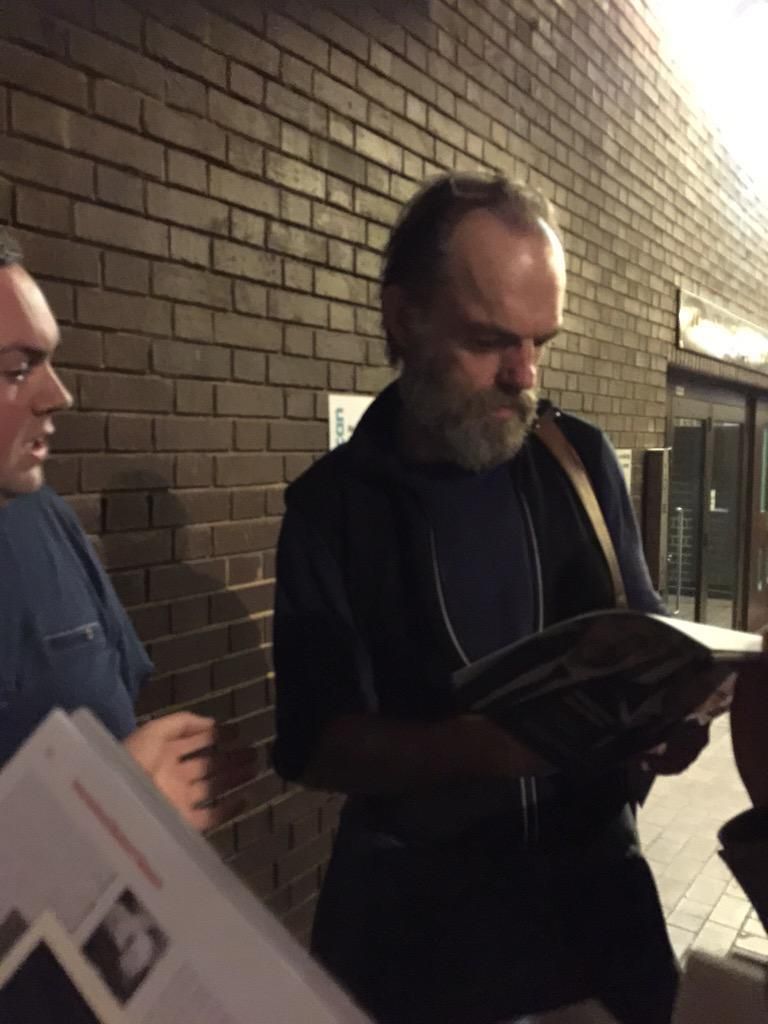
"#HugoWeaving I really really really love him.11 flight hours and jay lag is worthy,only because of his play. " Mimo via Twitter, plus next four photos
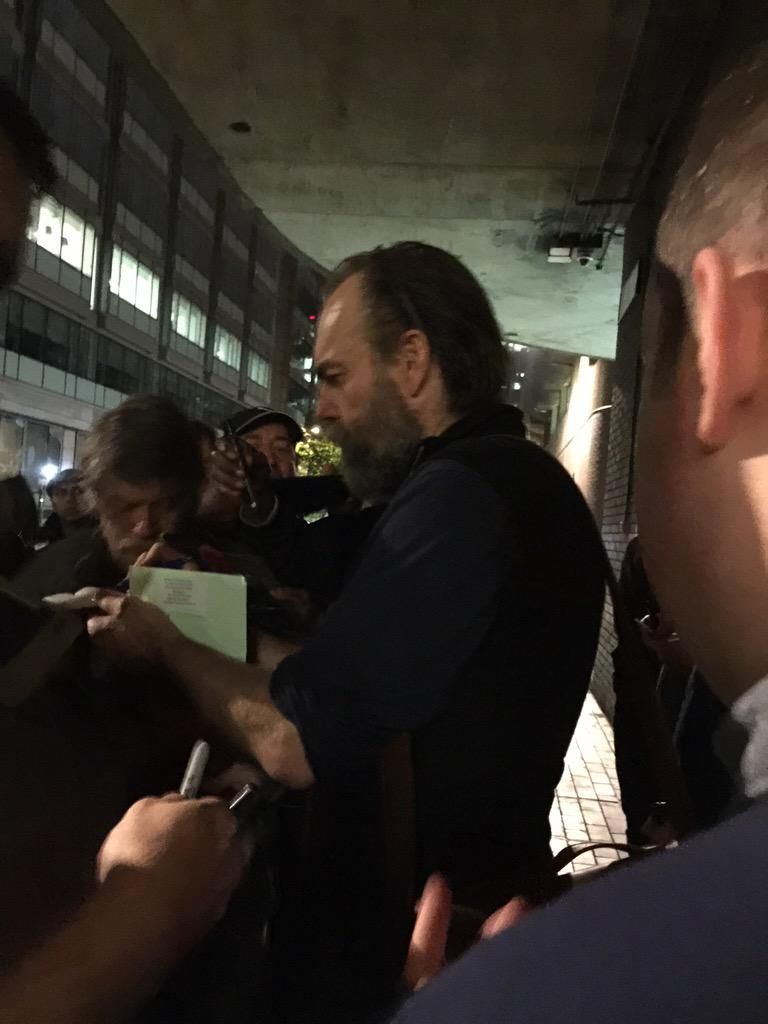
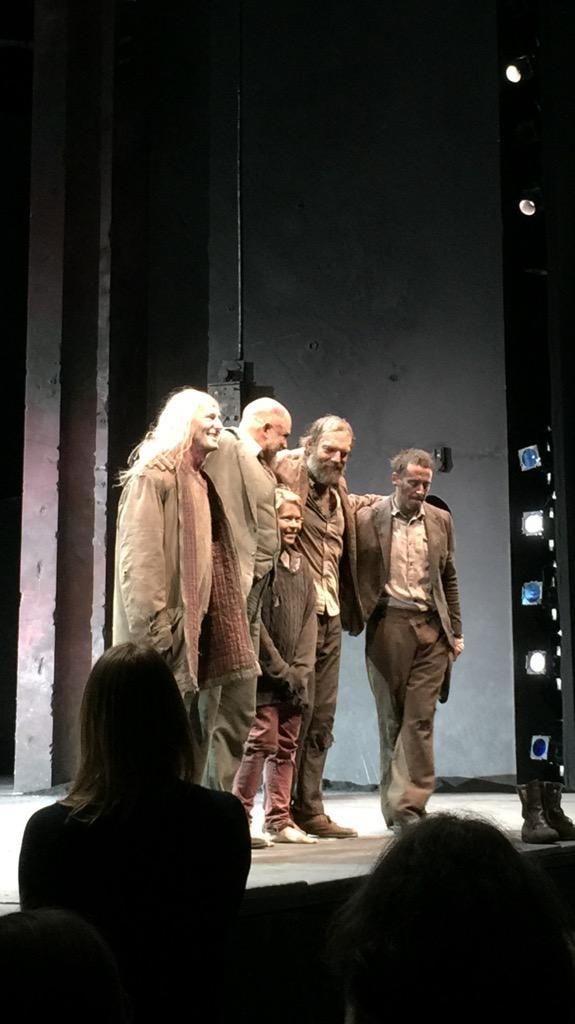
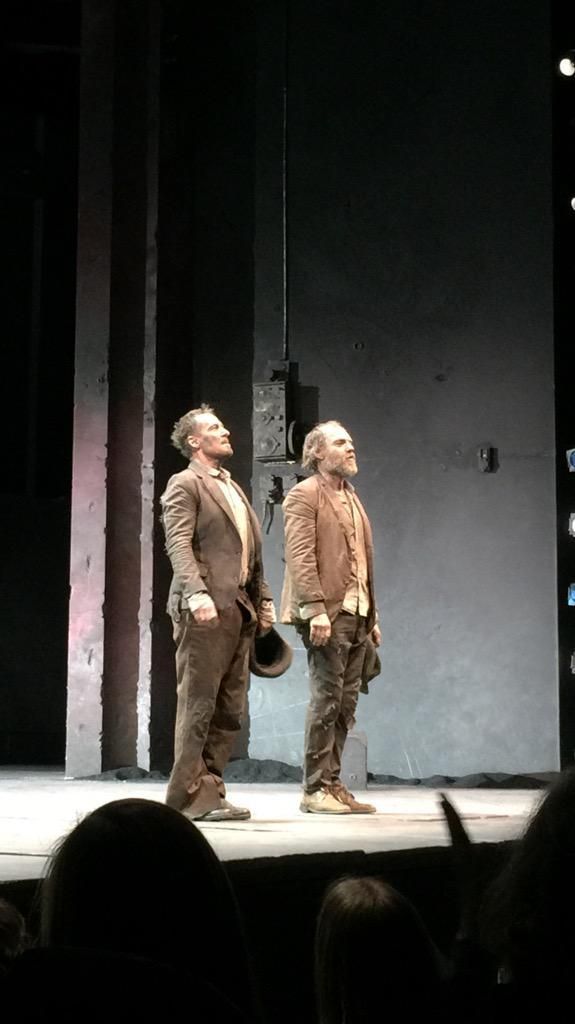
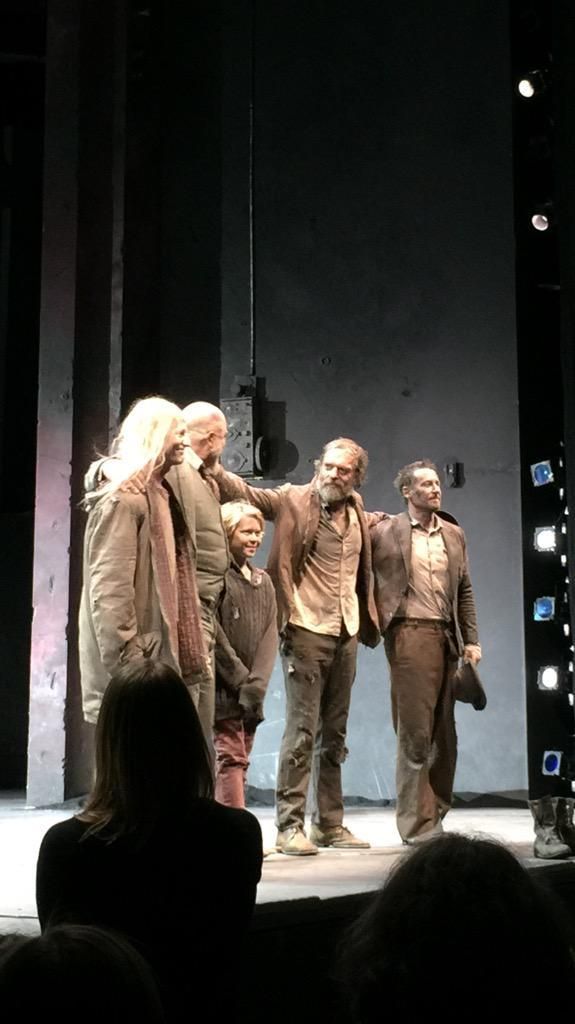
The Godot cast take curtain calls Photo: Mimo via Twitter
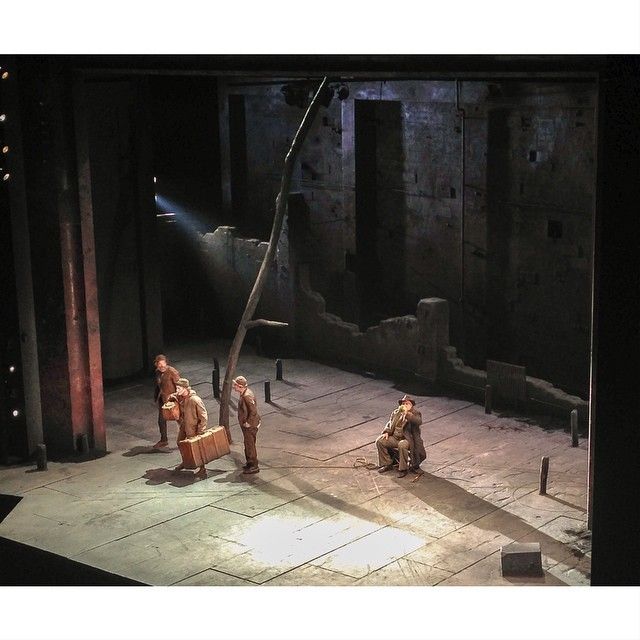
"Samuel Beckett's "Waiting for Godot" #london #theatre #godot #beckett #sydneytheatre #sydney #uk #hugoweaving #richardroxburgh #barbican #amazing" Klara Došlov via Instagram
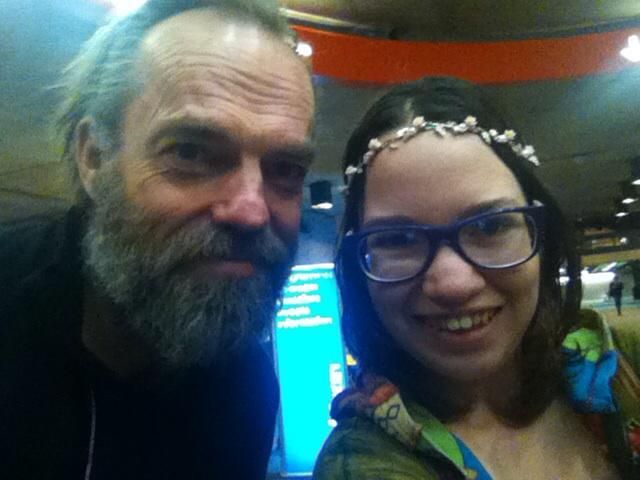
"Met my hero #hugoweaving while going to see #waitingforgodot " Lowdown via Twitter
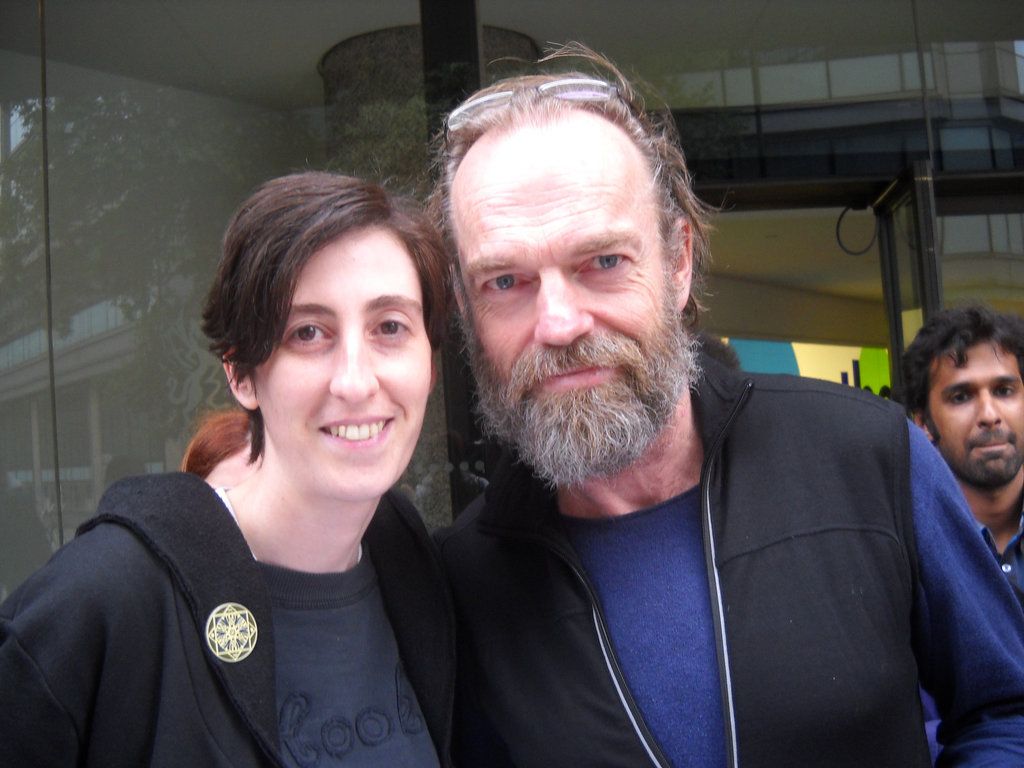
"Hugo Weaving and me" Belegilgalad on DeviantArt
There's a wonderful Spanish-language account of seeing Godot and the post-show Q&A at Londres en Espanol complete with some lovely photos (see below); fans who missed out on meeting Hugo or getting an autograph can again take solace in the fact that they were far from alone.
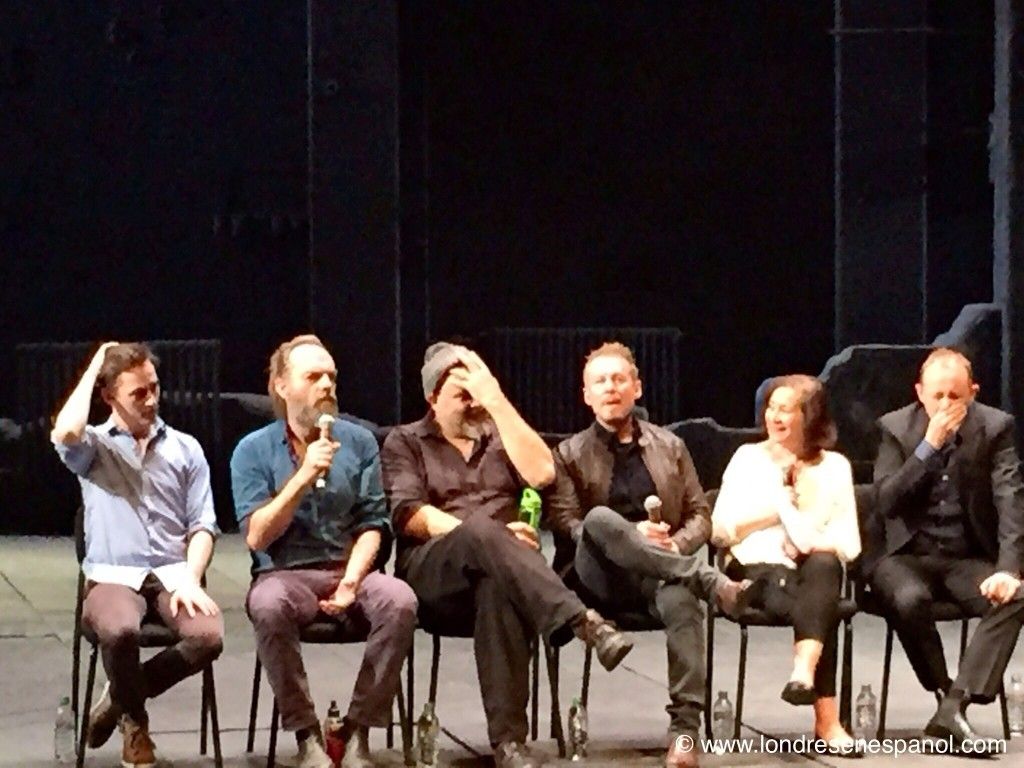
L to R: Luke Mullins, Hugo Weaving, Philip Quast. Richard Roxburgh, moderator and Andrew Upton at Godot cast Q & A 9 June. Photo (plus next 3 photos) Londres en Espanol
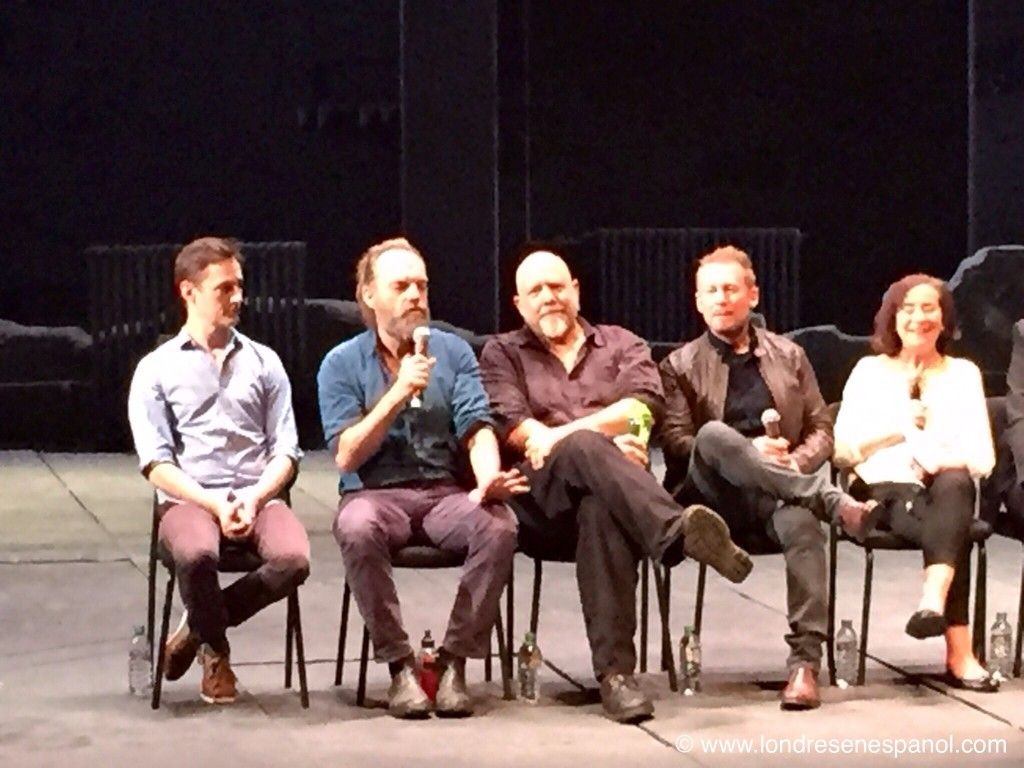
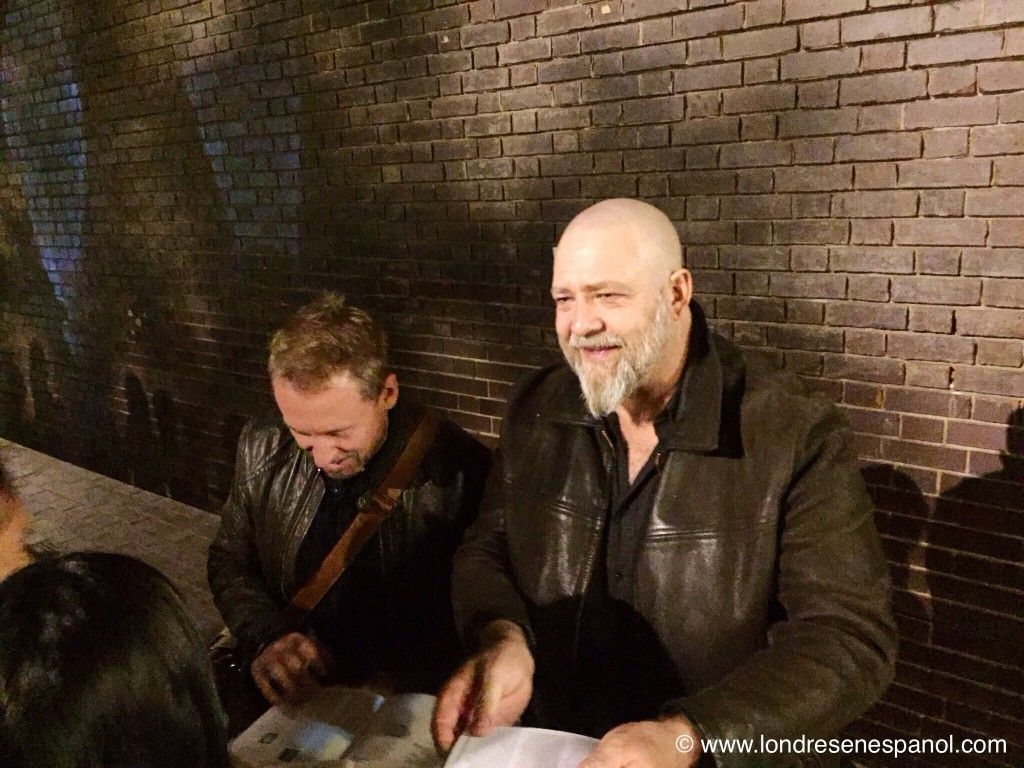
Roxburgh and Quast sign for fans
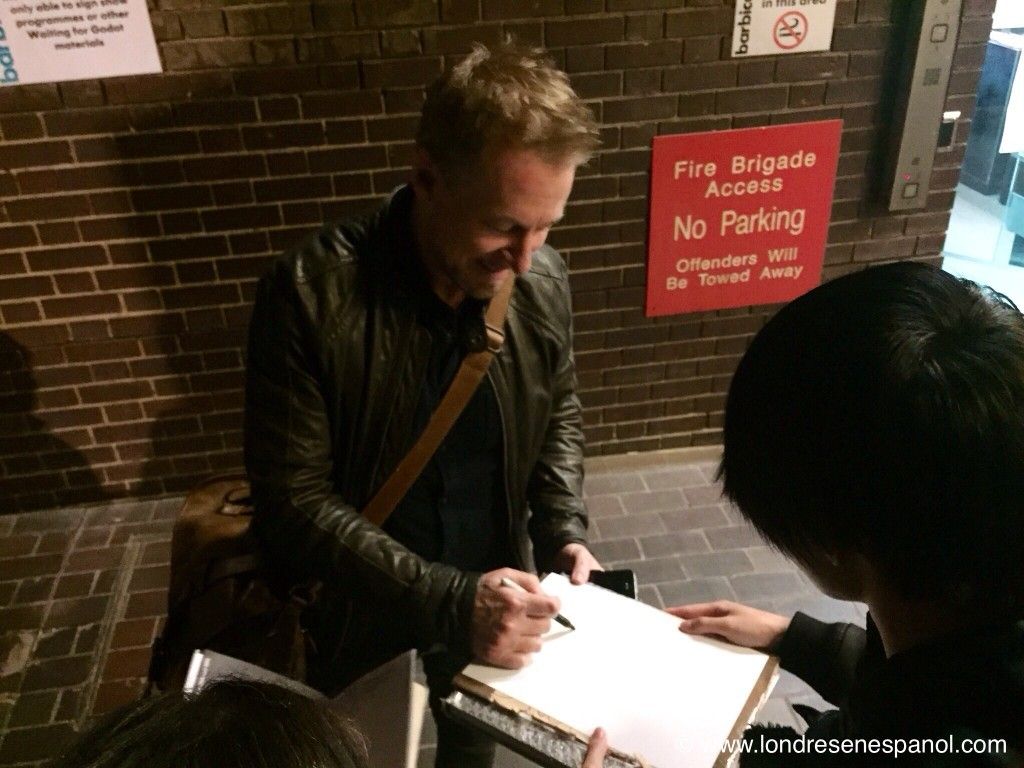
Richard Roxburgh
Godot and the touring production of The Maids (starring Cate Blanchett) are prominently featured in a report on STC's burgeoning profits and renovation plans, at The Sydney Morning Herald. The Daily Telegraph has already included the production on their list of 2015's Best Plays.
Finally, uberfan Rossetton G shared a mother lode of fan photos of the production and cast signings, these are but a few. You can see the full set here or on her Twitter feed.
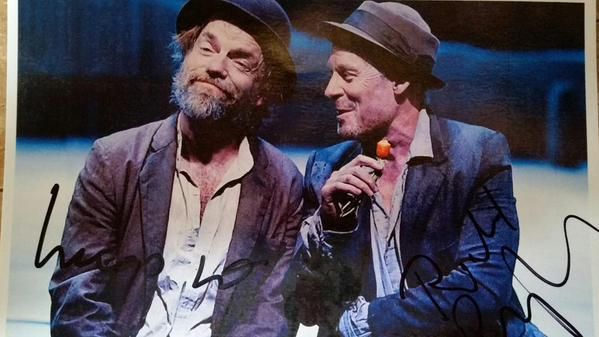
Hugo Weaving and Richard Roxburgh Godot autographs (original photo: Lisa Tomasetti) This and next photos: Rossetton G via Twitter
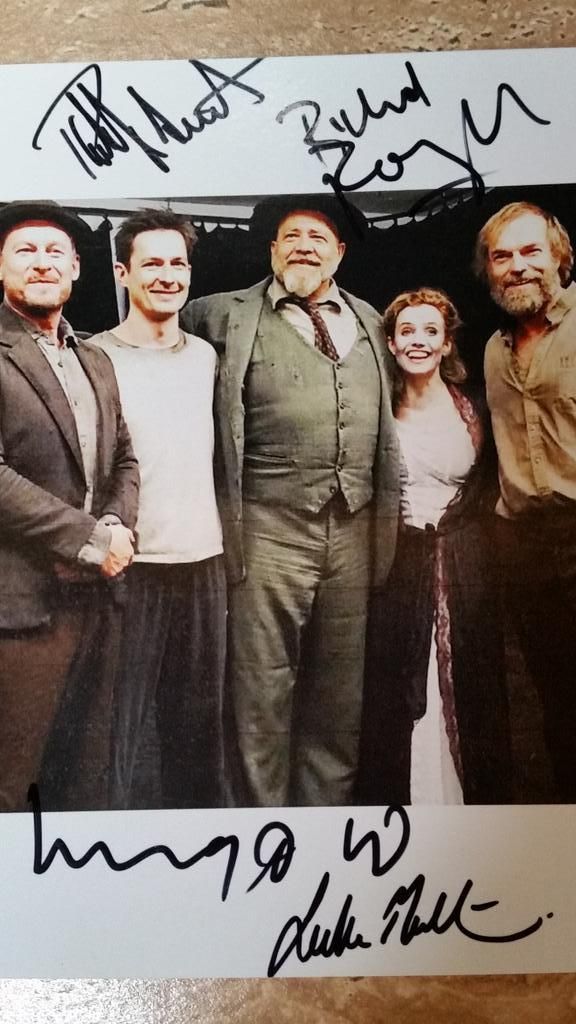
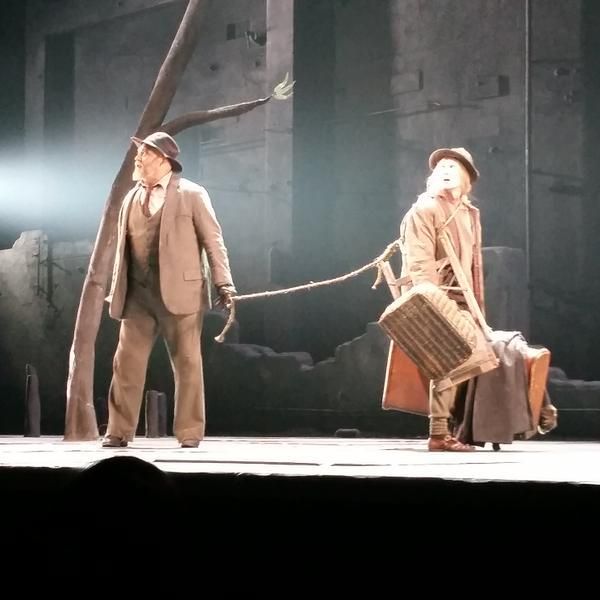
Luke Mullins and Philip Quast
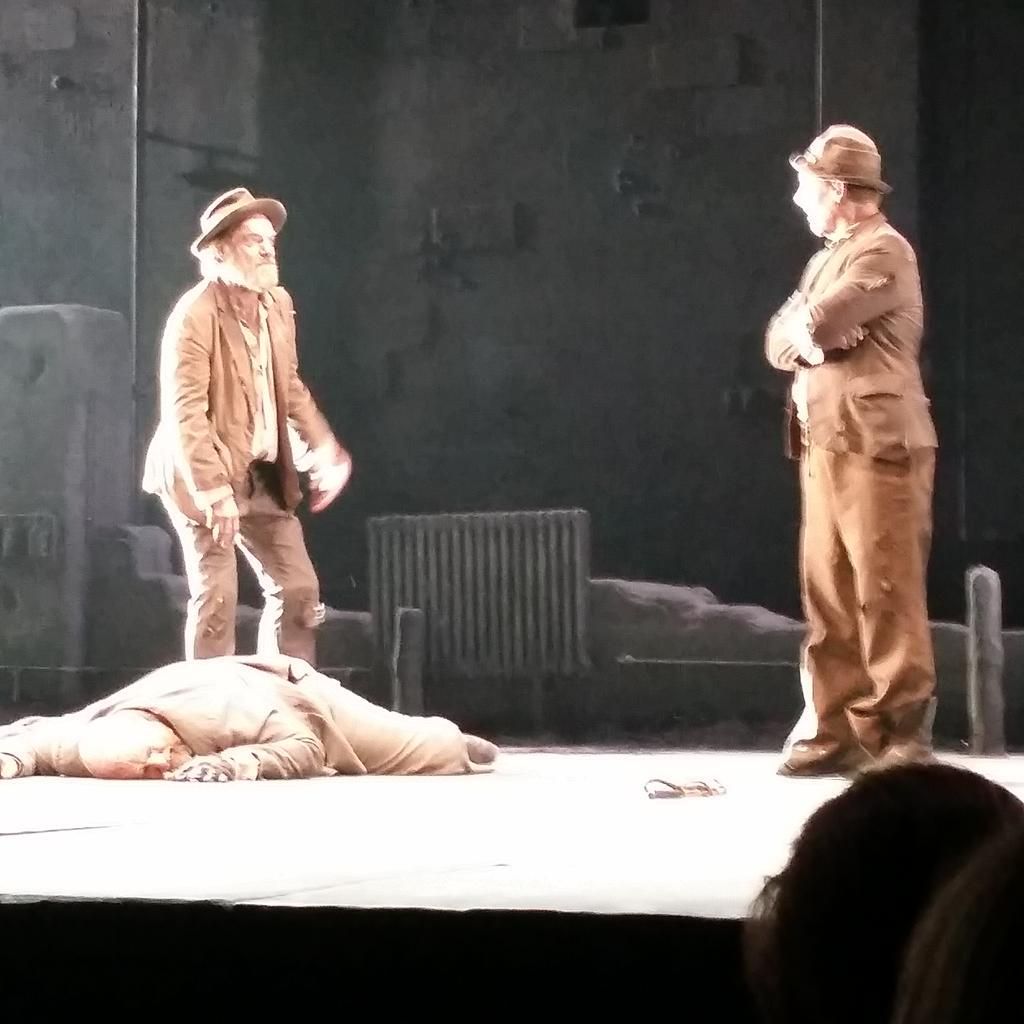
Quast (supine) with Hugo Weaving and Richard Roxburgh
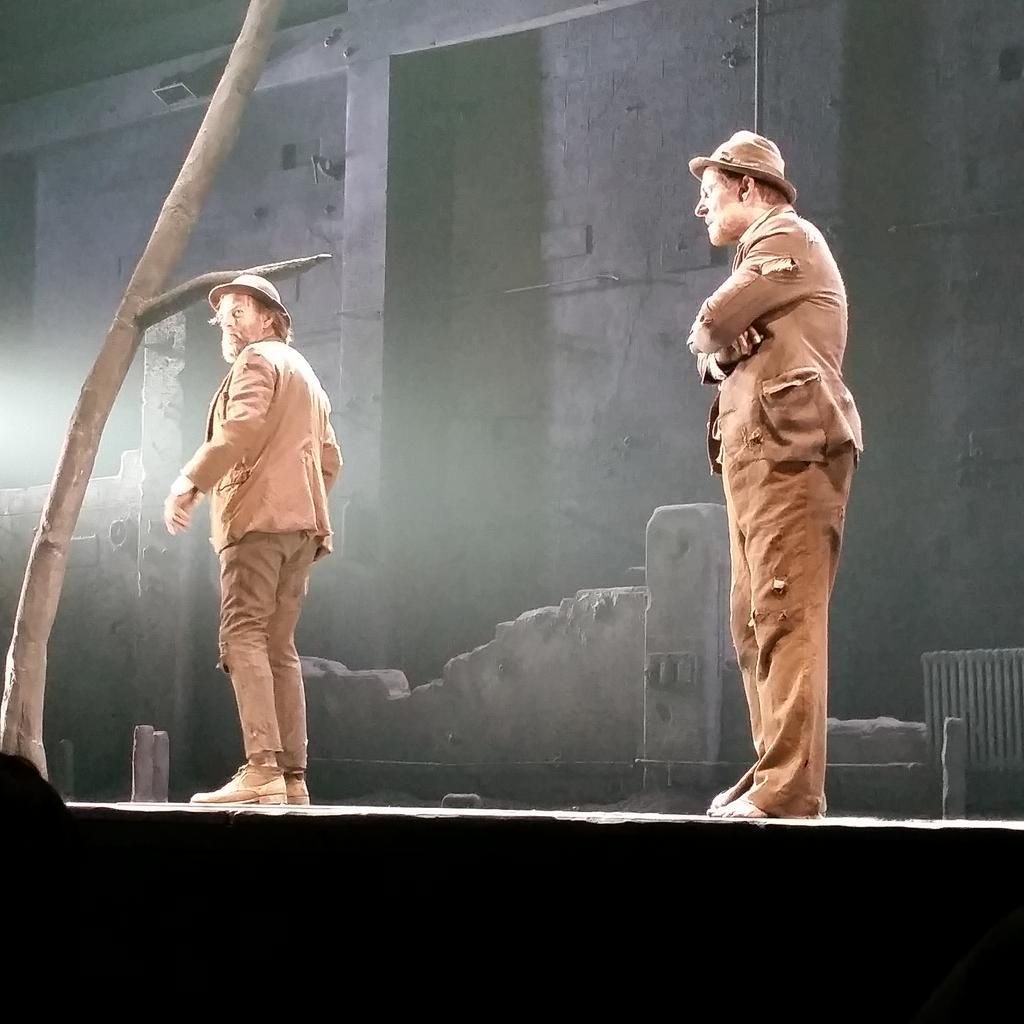
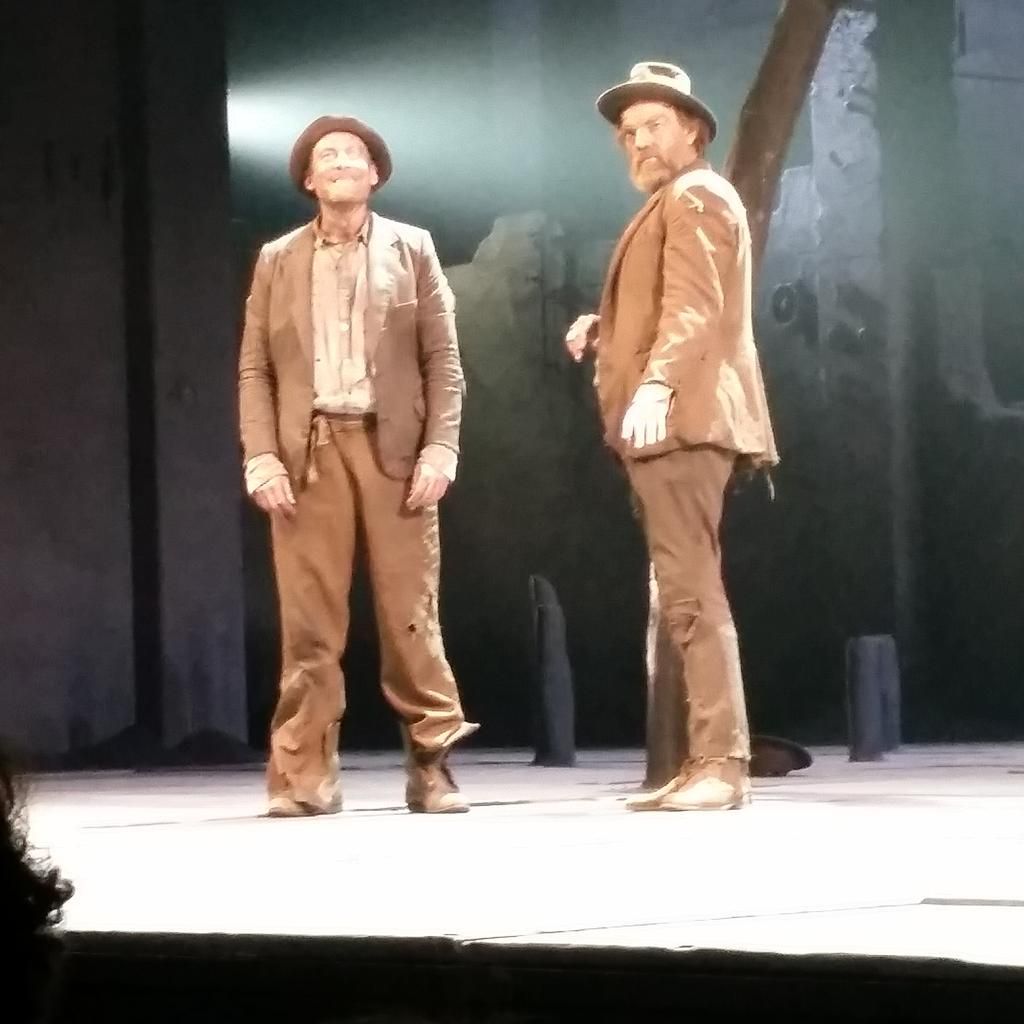
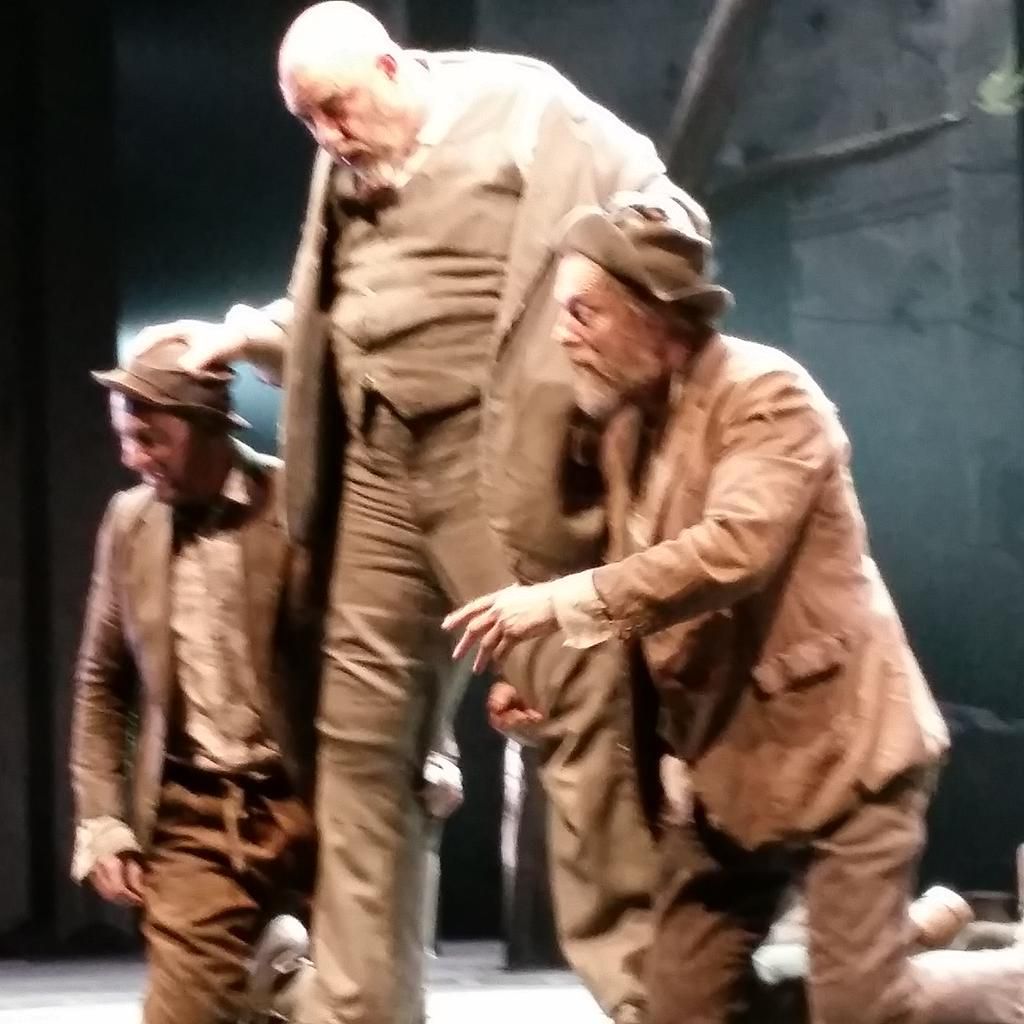
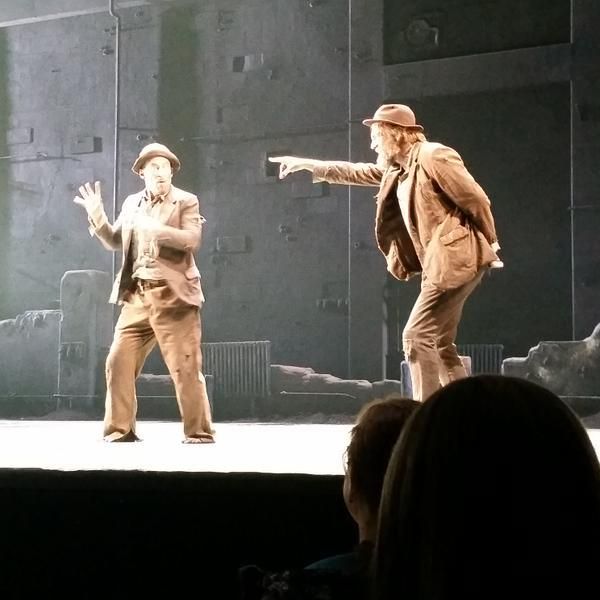
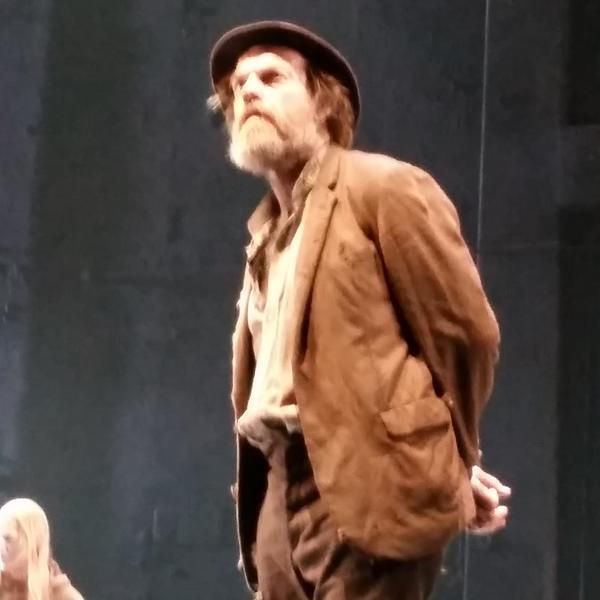
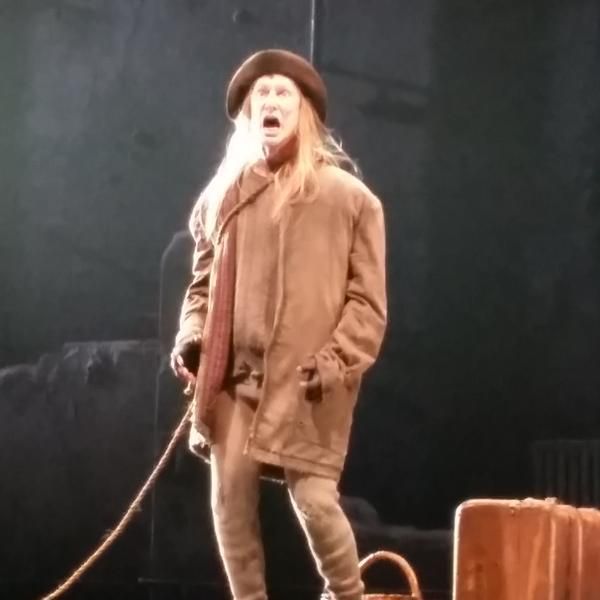
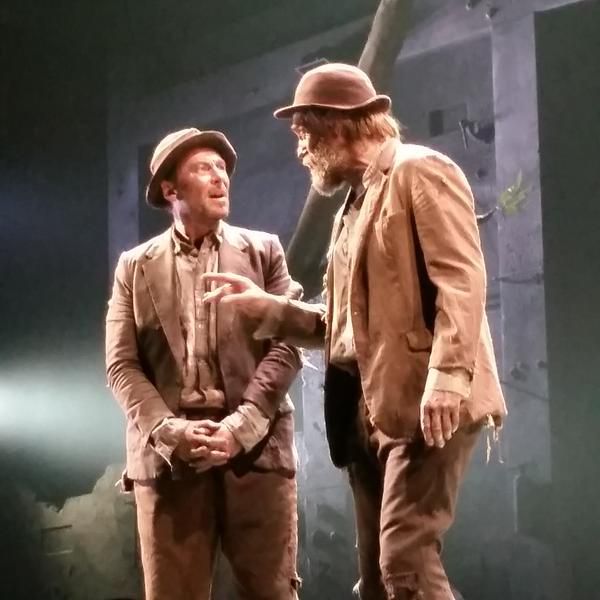
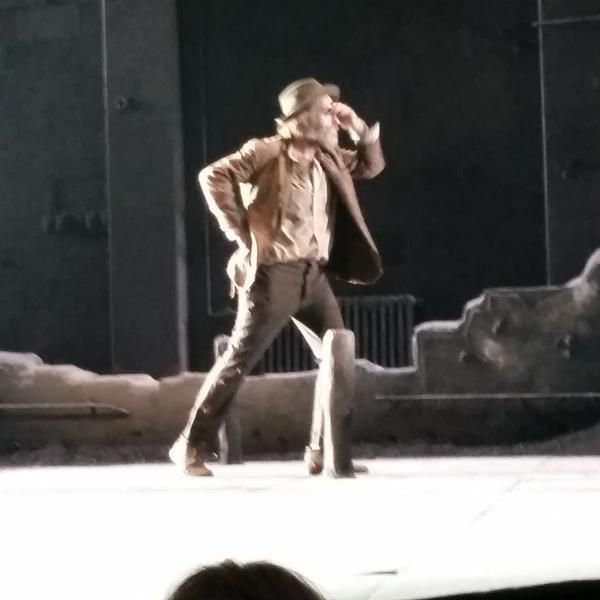
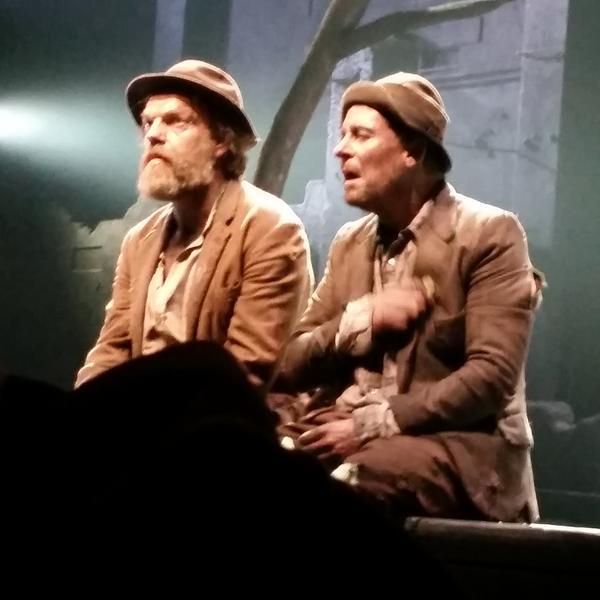
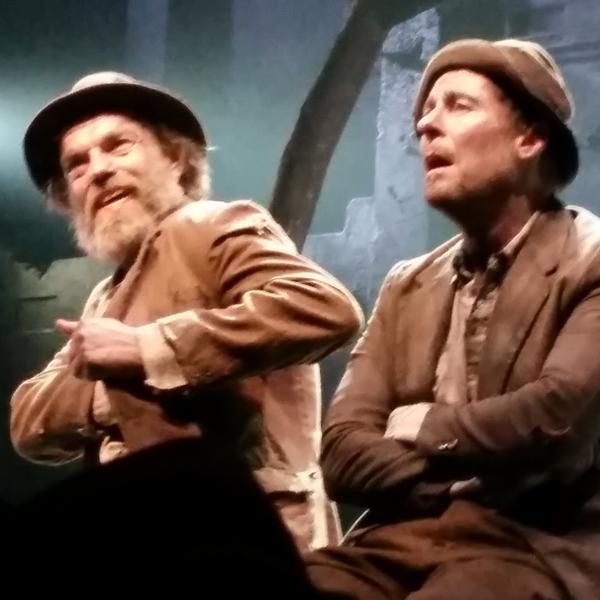
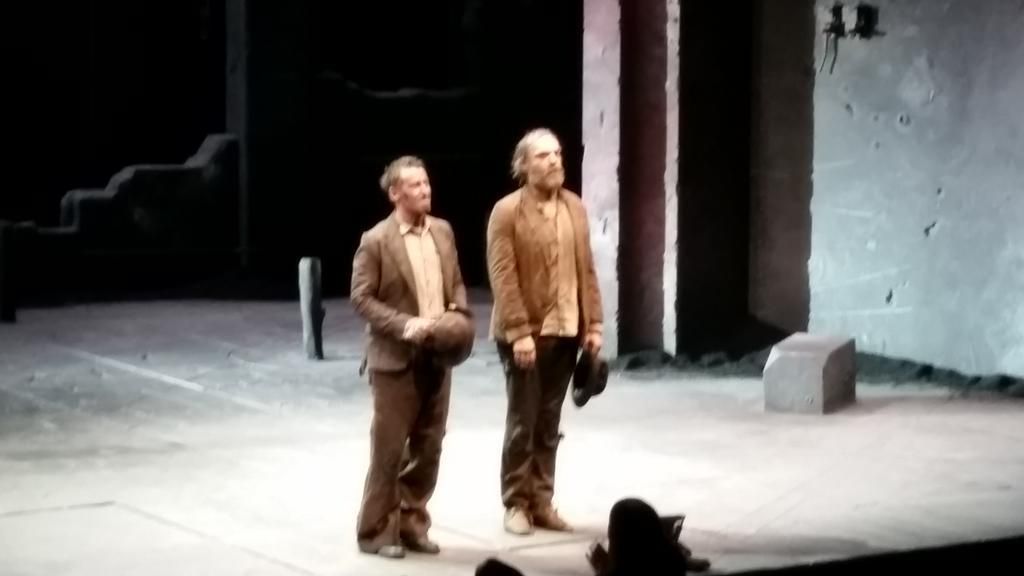
Curtain call
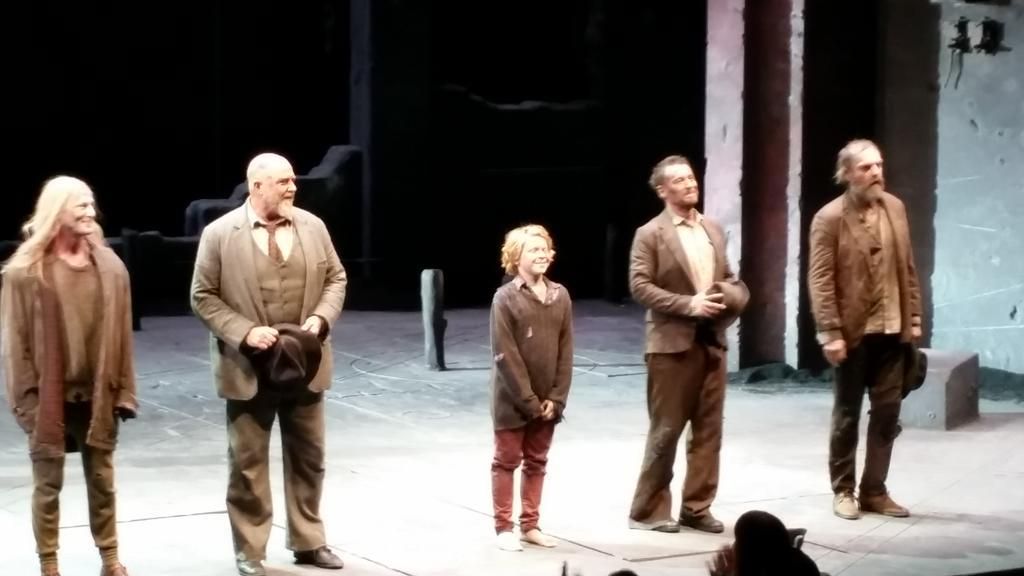
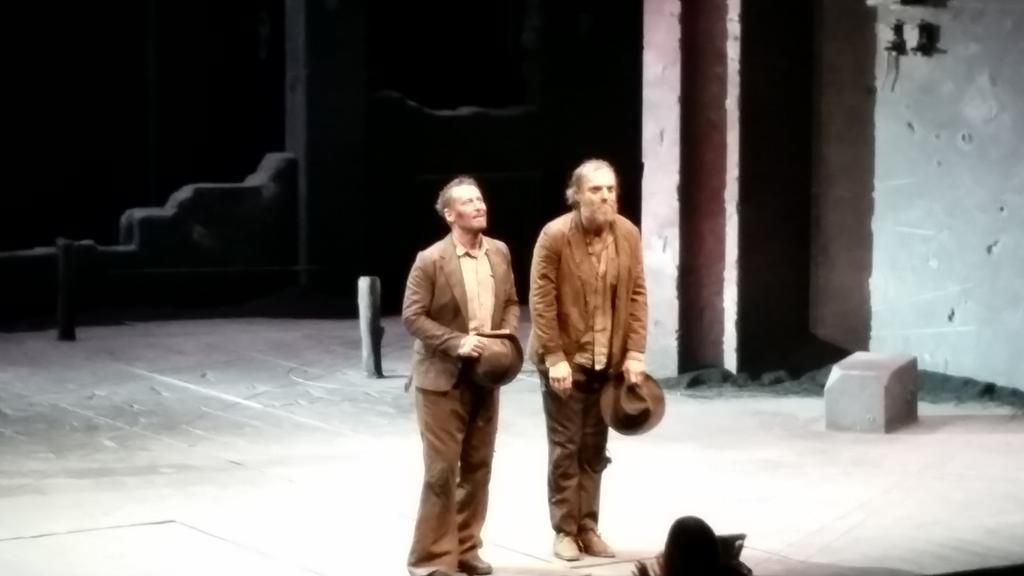
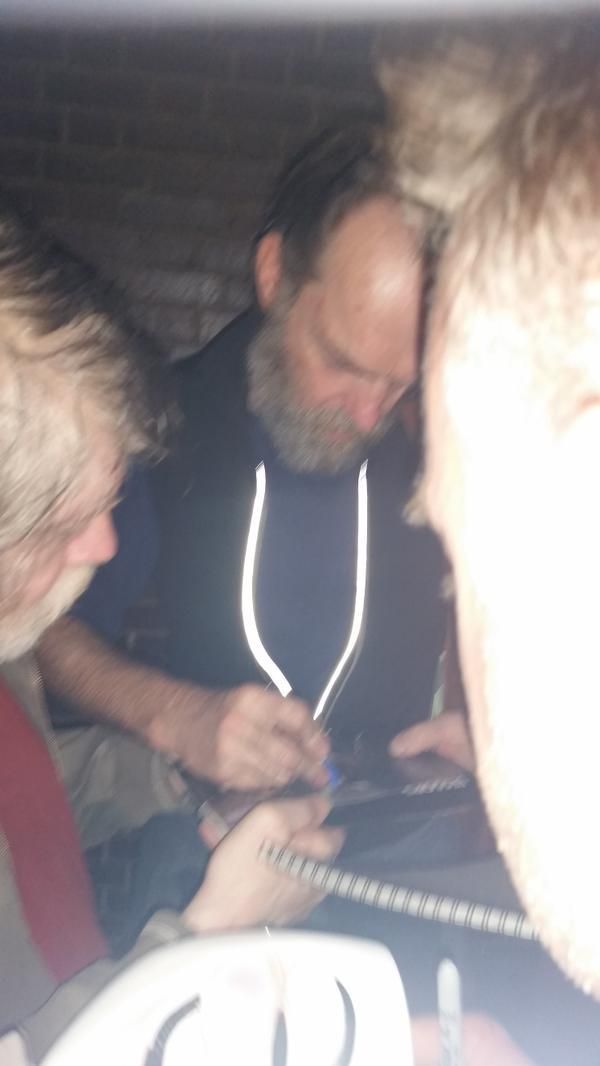
Hugo signing after the show
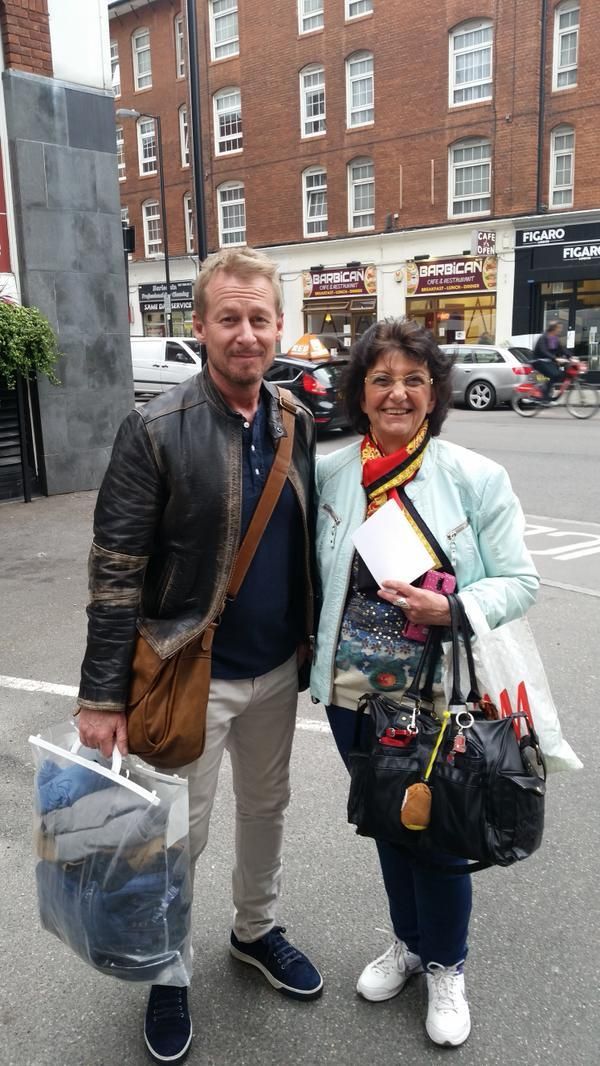
Rossetton with Richard Roxburgh (above) and Luke Mullins (Below)

On a more frustrating note, it seems the situation with professional autograph hounds/sellers and paparazzi interfering with fans' ability to get autographs was as bad or worse in London than it was during the New York run of Uncle Vanya in 2012. While many were lucky enough to have Hugo sign their memorabilia and pose for photos, many others missed out because either Hugo was mobbed by the "pros" en route to the theatre, because he felt overwhelmed or due to time constraints. In Washington DC (Uncle Vanya, 2011) there were security precautions in place to ensure only ticketed theatregoers could approach the stage door. There Hugo and other cast members (with the exception of Cate Blanchett) would often stop and chat with fans and sign or pose for photos. The crowds usually weren't overwhelming and were unfailingly polite. In New York, this setup was impossible and the cast were usually mobbed both en route to and leaving the theatre. Autograph hawkers would present Hugo with STACKS of glossies from The Matrix, LOTR or Captain America and expect him to sign multiple copies which would clearly then be hawked on eBay. I really couldn't blame him (or Cate) for finding alternate exits to the theatre, though this short-changed genuine fans of what in some cases were once-in-a-lifetime opportunities.
Hugo hadn't performed in an STC production in London (or Europe) before Godot, and the run was slightly longer than a week, meaning there would be exponentially many more fans waiting for their opportunity to meet him or have him sign. I wish the theatre had some sensible security measures in place to prevent the "pros" from crowding out real fans, but I understand that sort of thing is logistically difficult. In New York, especially on Broadway, it's impossible, as many stage doors open directly onto main streets/sidewalk; there are usually a few barricades put up, but very little in the way of crowd control, and certainly no way of controlling who has access to the actors, who are often forced to either spend a huge amount of time attending to a vast number of people (many of whom, as I've said, aren't there to see the play), to sign a few autographs for people lucky enough to be in the right place at the right time right next to the security barricades (and short-change many more) or flee to their waiting cars immediately, either as the fans watch or via an alternate exit. None are optimal solutions, and even successfully keeping the "pros" at bay might solve the problem, especially if there are a lot of ticketed theatre-going fans and a limited number of stage door opportunities.
During the 2013-4 run of "The Other Godot" featuring Ian McKellen and Patrick Stewart on Broadway, the actors got out the word that only play-related memorabilia would be signed, and this helped. (I noticed it was a stated policy for this run of Godot as well, though many fans ignored it.) There was also a ban on requests for photos with the actors, though people were free to take photos OF them: my boyfriend took some great photos as I got my autographs.) In that case the stage door opened right onto the street next to the theatre entrance, making it very easy for everyone in the theatre to immediately line up behind the security barricades the moment a performance ended. I was "lucky" enough to have seats near the rear of the orchestra which allowed me to get in place quickly, and was lucky enough to get signed by all four actors. Sir Ian and Billy Crudup (who played Lucky) in particular were astonishingly generous with their time, signing for pretty much everyone who asked. (As far as I know, Crudup might still be dispensing hugs and signatures outside the theatre.)
Patrick Stewart signed a few dozen autographs then quietly disappeared, disappointing many fans. He seemed less comfortable with this aspect of fame, a feeling I know Hugo shares, though he's wonderful and charming to fans when there aren't quite so many of them. Stewart also "shorthanded" his signature into a barely-legible scrawl, something Hugo is doing a variation of (just signing "hugo w", though at least this can be readily made out.) I'm sure this is done to save time when there are huge numbers of fans waiting their turn. I don't think it's anything personal or makes the signature less "valuable"... if you're getting the signature for any other reason that to have a cherished keepsake of an artist you admire (or an event you enjoyed), frankly you're part of the problem. By that I mean I don't know or care whether variant versions of Hugo's signature have different values on eBay or the like. I have always discouraged fans from buying these, as fraud is rampant, and because each legit autograph obtained by a "pro" means one less signed for a fan who actually attended the performance and may have waited years. I do know professional autograph collectors/sellers perversely find inscribed items somehow less valuable, to the extent they'll sometimes hack off an inscription to a fan from an item then slot the signature into a frame with a generic photo. Real fans would of course find an inscribed autograph the most precious keepsake of all.
I've been lucky enough to have Hugo sign for me a few times. I say "lucky" because he's dodged me and others a few times too... though this can be gutting when it happens, I don't blame him in the least. I admire Hugo's modesty and lack of interest in fame for its own sake, so I understand why the notion of signing for dozens of people every night-- a number of whom are just having him sign "marketable items" connected to his most famous roles, for resale-- might give him pause. As fans, we don't have a "right" to autographs. It's a privilege we're sometimes granted, but actors deserve their privacy and space too.
As for what advice I'd have for other seeking autographs, I have a few suggestions, but there are no guarantees; as I keep emphasizing, it all comes down to luck. But it helps to attend more than one performance for a play, as this increases your opportunities to get signed. Try to attend less-busy performance nights (I usually try for a Tuesday) rather than Friday/weekend evenings which will be busier. (This may fluctuate based on a theatre's schedule: most US productions are dark Monday with nightly performances Tuesday through Sunday and matinees Wednesday and Saturday (or Sunday in some cases). Don't expect to get signed on the last night of a performance, as there are often cast parties and celebrities in attendance who'll be granted extended backstage access. Even if an actor leaves via the stage door in these cases, he may well be exhausted. If you're attending on a day with two performances, try for the earlier one for the same reason. but be aware the actors may be pressed for time in either case, and in some cases might not even leave the theatre. Don't breach security, don't approach the actors on their own time (I did once get signed when Hugo was entering the theatre, but I felt a bit dodgy about the whole thing).
If permitted, have him sign something unique which has personal meaning to you, but is NOT connected to his most famous work, ie so he'll know it won't be resold, and that you're aware of his entire career, not just the odd franchise. (I had my loveliest response from Hugo when I had him sign my DVD of Last Ride.) If the venue posts rules about what can be signed, or whether or not actors will pose with you, abide by them. I'm often asked about gifts, but have never tried giving them; in New York in particular security can be strict about that sort of thing. The best anecdotal stories about actors receiving gifts involved handmade or particularly creative/unique items. Finally, allow for the possibility of failure and understand that it's nothing personal. There many actors who've creatively dodged my every attempt to get an autograph (Cate Blanchett springs to mind; she signs sparingly if at all. Many actors have no-autograph policies.) Your emphasis should be on enjoying the work-- the play, film or whatever you're there to see-- rather than on bagging that autograph. And keep trying. It's good to have long-term goals or dreams. I waited over 20 years (and saw many plays) before I got signed by McKellen and Stewart, then got signed by both within 30 seconds of each other, then it was all over. ;) It was as amazing as you'd expect, but you can't harbor dreams of extended conversations or of an artist intuitively understanding just what he's meant to you over all these years.
As always, my eternal gratitude to all the fans who shared their photos and stories. It made for a wonderful vicarious experience for all of us who couldn't be there in person.
Strangerland
Kim Farrant continues to do most of the publicity for Strangerland in its Australian release, and has given many in-depth, thoughtful interviews on her process of making the film, You can hear/read these at SBS (also features three short scenes from the film), ABC Radio Brisbane, Junkee, Community News, Foxtel Screen, Rip It Up, Eff Yeah Feminism podcast, Film Ireland,
The most in-depth discussion of the film is probably a fascinating 35 minute conversation at Ben Mizzi's Screen Director Podcast. The article which gives the most attention to Hugo's contribution is at The Australian. (Print version here.) " 'Knowing him as a person, we both realised this part of him doesn’t get seen on screen,' Farrant says. “Hugo’s often portrayed on screen as this villain, a cold, aloof man and he’s actually very sensual and beautiful and loving and sensitive, so it was: ‘Yes, let’s cast him!’ ”
Farrant discusses her future projects at Inside Film: one hopes she doesn't fall into the trap of so many directors who come to the US either to be treated shabbily (as was Rowan Woods) or downgraded to tedious franchise gigs (too many to count.) Yes, I know the US media considers a director to have only "made it" when they get that Marvel franchise gig (or the equivalent) but I strenuously disagree. ;)
You can hear positive or leaning positive audio reviews at ABC News Breakfast Here are quotes of text reviews with links back to sites of origin:
Glenys, The Ponder Room: "Set in hot outback Australian the imagery is beautiful, think Picnic at Hanging Rock, which Farrant explained was one of her influences...
Strangerland is a slow burn. It explores a mothers anguish, our perceptions of people with diminished mental capabilities, and what happens when secrets are kept. It’s always good to watch Weaving at work and this was no exception. Kidman appears suitably vulnerable as a women suppressing her own demons. The young cast of Maddison Brown, Meyne Wyatt, Sean Keenan and Nicholas Hamilton suggests that the future of Australian film is in good hands."
***
Michael Bodey, The Australian: "Kim Farrant’s Strangerland is a cool whodunit and character study featuring charismatic performances from Nicole Kidman and Hugo Weaving. Joseph Fiennes’s turn as the absent husband is a handbrake on a moody film, though."
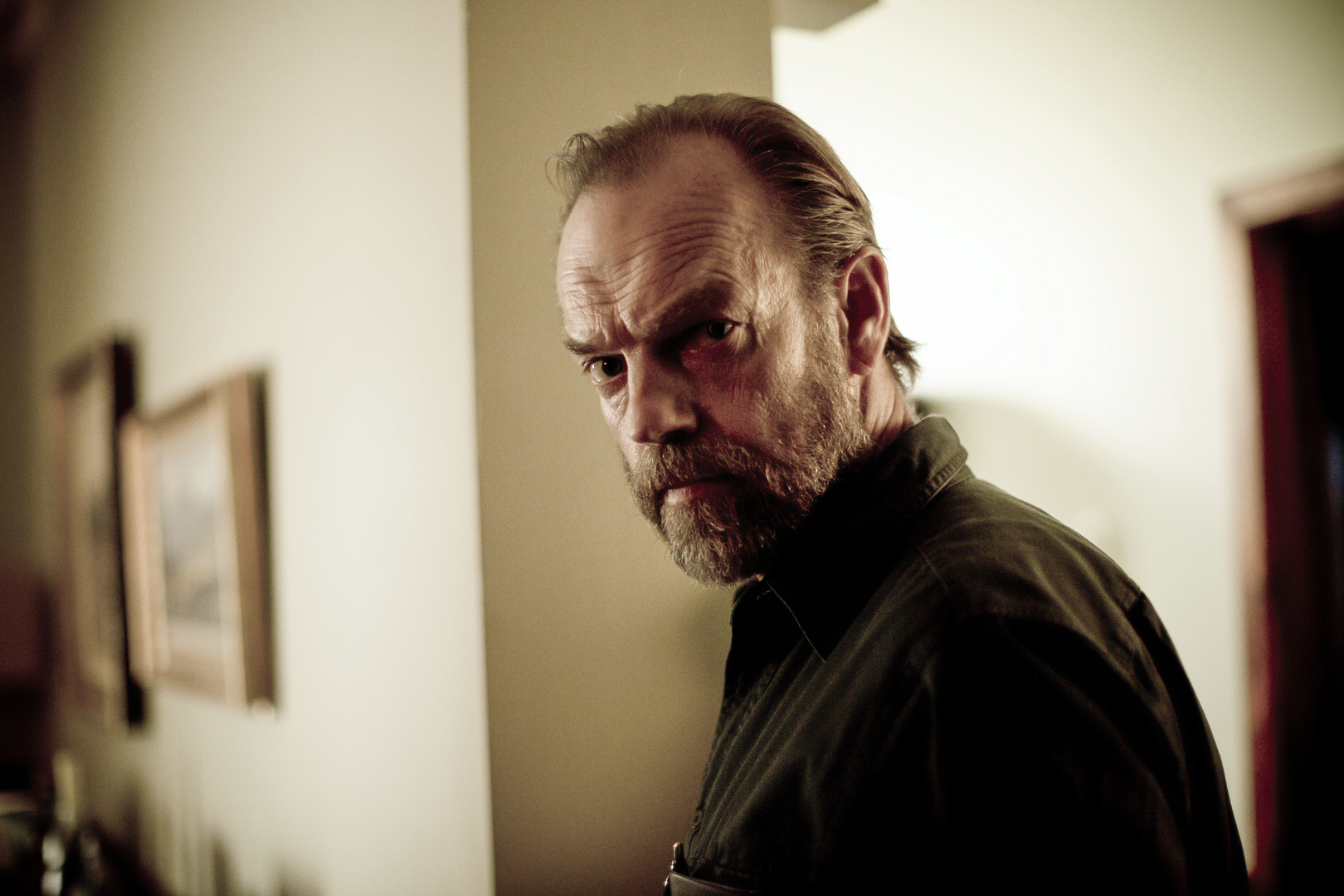
Hugo Weaving as David Rae in Strangerland, from the film's press kit
Alex Doenau, Trespass Magazine: "Australia is a big country, with the capacity for many stories. Some of our finest stories have been brought to the screen courtesy of Nicole Kidman, and this time she has swapped BMX Banditry for desolation of the soul. For the most part, it works...
Strangerland is a movie that comes down to its performances, essentially filling in a blank slate of relatively anonymous Australian countryside. The fundamental question of why a family that wanted to avoid attention moved to an area small enough that everyone would be at least familiar with them is never addressed, but Kidman and Fiennes still manage to do well as a troubled couple precisely because they never quite work together...
Kidman’s performance is varied, but in a way that complements the film and the character. Sometimes she seems to be literally sleepwalking in front of the camera, and that actually suits the themes of the film, which she has to shoulder herself... The other standout is Weaving, continuing his streak of well-chosen character roles in Australian films. The most rounded and approachable character, Weaving is also the touchstone for the film’s barely explored racial issues, which largely manifest as obvious red herrings...
A stirring portrait of a couple that should possibly have never been together, Strangerland is an uncomfortable experience that works because of its scattered pieces not quite fitting. A daring debut that hypnotises as it obscures its core truths, and proof once more that Nicole Kidman is an asset to any country’s film industry."
***
Cara Nash, FilmInk: "There’s no doubting that Farrant has a gift for mood, building a sense of dread, isolation and gaping sadness that threatens to swallow everyone whole. Strangerland is a challenging watch, but it’s also wholly compelling, and that’s largely owing to the superb performances across the board. Kidman is in fearless form as Catherine, a woman wracked with pain, guilt, self-doubt and a desperate need for connection - whether that be with her emotionally cold husband, the town’s empathetic cop or her wayward daughter, who she questions how much she is like. As always, Weaving is solid as an inherently decent cop trying to navigate his way through increasingly complex moral territory, while one feels Fiennes’ Matthew may implode because of all the repressed rage he’s carrying around...
The idea that the Australian outback is a dangerous and unknowable landscape is one that has populated many a local film, and while Farrant introduces ideas about the spiritual connection to the land of indigenous people, these ideas are never fully fleshed out. The filmmaker, however, bravely refuses to offer any type of closure - which is fitting given the many heartbreaking, haunting questions her central protagonists are left to live with. "
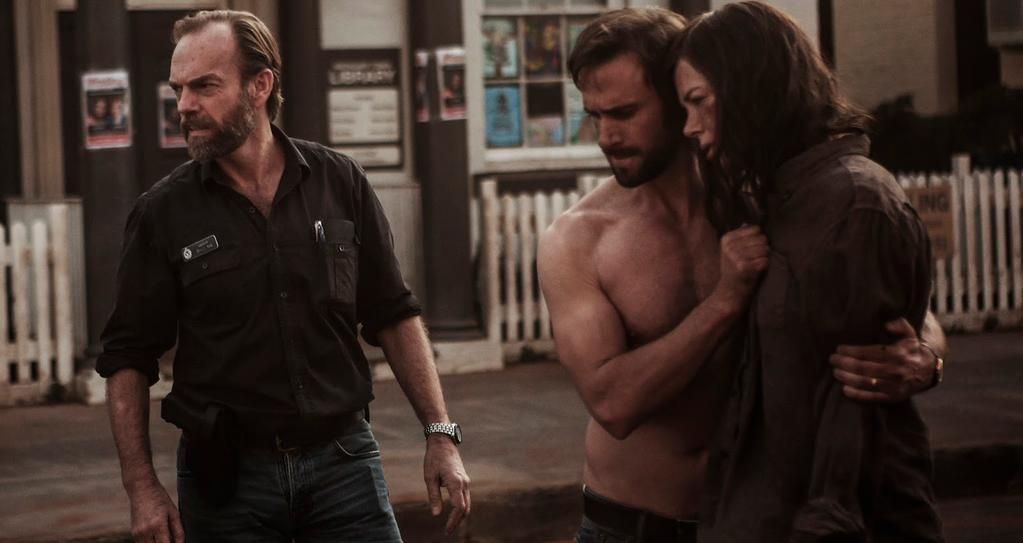
Hugo Weaving, Joseph Fiennes and Nicole Kidman
Glen Falkenstein, Film Ireland: "Farrant’s focus on Catherine’s feelings of grief and hopelessness drove much of Strangerland, resulting in an eerie, disquieting and all-round consuming tale of two estranged parents coping with the loss of their children. The performances from Weaving and Kidman in particular were practiced and immediately impactful. As the characters steepen into fear, panic and at times hysteria, the very visceral racial and sexual tensions between the characters came to the forefront, resulting in several tense and confronting sequences. No small part of the film, the relationship of both Indigenous Australians and the recent arrivals to the land played a crucial role, driving much of the dramatic tension."
***
Andrew Nette, Pulp Curry: "What makes Strangerland innovative is its portrayal of female sexuality, both Lily’s and her mother, Catherine’s, which is unflinchingly rendered and is something you won’t see very often because of the hot button issues it touches on. As part of this, Farrant puts a new spin on the how the parents deal with their grief over the missing children. This involves her examining a shadow side of female emotion that is seldom talked about, let alone put on the screen...
Strangerland also excels in depicting the sense of frustration and desperation faced by the parents and the police at the prospect of having to search for two missing children amid the huge expanse of inhospitable countryside. The way the camera pans and sweeps over the desert and gorges is both beautiful and terrifying. Farrant is also to be congratulated for eschewing an easy plot resolution in favour of something much darker."
***
Glenn Dunks, Writing: "Kim Farrant’s Strangerland is deeply, uncomfortably Australian. In many ways, it goes right to the heart of the country as a family infiltrate a place that is unfamiliar and even hostile to their arrival. A family, all of whom hold secrets and potentially criminal pasts. They could have been dressed up in Colonial costumes and set 150 years ago without much of a narrative alteration, which is probably much the point of Farrant’s debut feature. How our convict pasts have manifested as a society that turns on its own as much as the other...
Most of all, however, Strangerland reminded me most of all of the early features of Peter Weir. The aura of Picnic at Hanging Rock’s lingering natural menace mingled with repressed teenage female sexual awakening hovers heavily over this new film albeit in a more narrative-focused way. Weir’s The Last Wave, a film that has challenging ideas over the role that one of Earth’s oldest civilization and their subsequent genocidal mistreatment might play in our way of life, is also evoked although Farrant doesn’t go quite to the extent of that film’s chilling, apocalyptic ending...
Despite the power of that particular scene and the performance of Kidman that crescendos in the dying sunset of the film’s final passages, Strangerland’s final act is still somewhat bungled in terms of its pacing. Hardly a new issue with Australian film as Farrant is clearly trying to leave a lasting impression of mood rather than a satisfying narrative conclusion, although the promise of the previously raised concept of mysticism isn’t fully delivered upon either. Likewise, the character of Lily is clearly one that we’ve seen before, most prominently in Rachel Ward’s Beautiful Kate (this could almost be a sequel), although her naff teen poetry is comically on point (“Their marriage is a farce / such a pain in the arse”, for instance). Still, I found so much to admire in the glowing, dusty cinematography of P.J. Dillon, Keefus Ciancia’s haunting music and the performances of Kidman, Hugo Weaving and Lisa Flanagan that I didn’t mind much at all. I was deeply impressed by Strangerland and likely for many of the reasons that others have not."
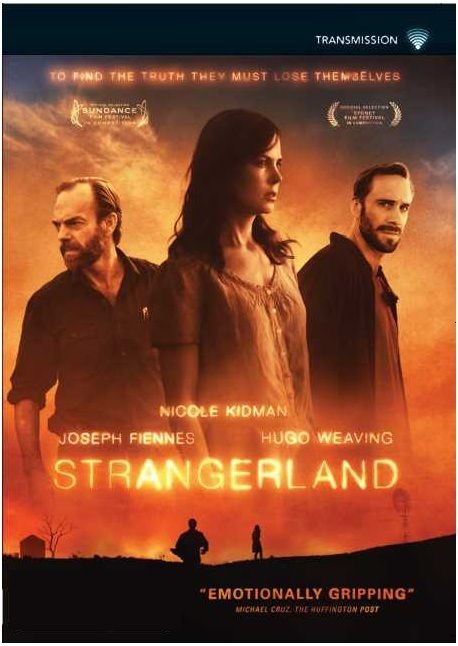
Alternate poster for the film's Australian release
Bernadette Pierce, The A and B Film Podcast: "Many critical reviews of Strangerland cite a lack of focus and believable character development and while watching the film I too found myself longing for certain aspects of the story to be focused on in lieu of another story that invokes the dangers, mysticism’s and history of the Australian outback. Reviews have also been critical of the ‘distracting sexuality’ in the film, Farrant has stated that she wanted to look at ways that people deal with extreme emotions, in particular those who use sex as a way of dealing with those emotions. The Parker women use that primal desire and act to cope with varying degrees of apathy, loneliness and for Kidman’s Catherine - the fear and grief she feels regarding her missing children and as the film progresses, her uncertainty about her husband. Perhaps how you respond to these character actions will depend on your own life experiences and propensity to use irrational or even self-harming coping mechanisms. I found the portrayal of sexuality in the film to be interesting, unsettling and honest."
***
I've added the full Strangerland press kit and a couple of stills featuring Hugo to my Flickr Hugo Weaving Archive. And here are my scans of a Sydney Film Fest brochure:
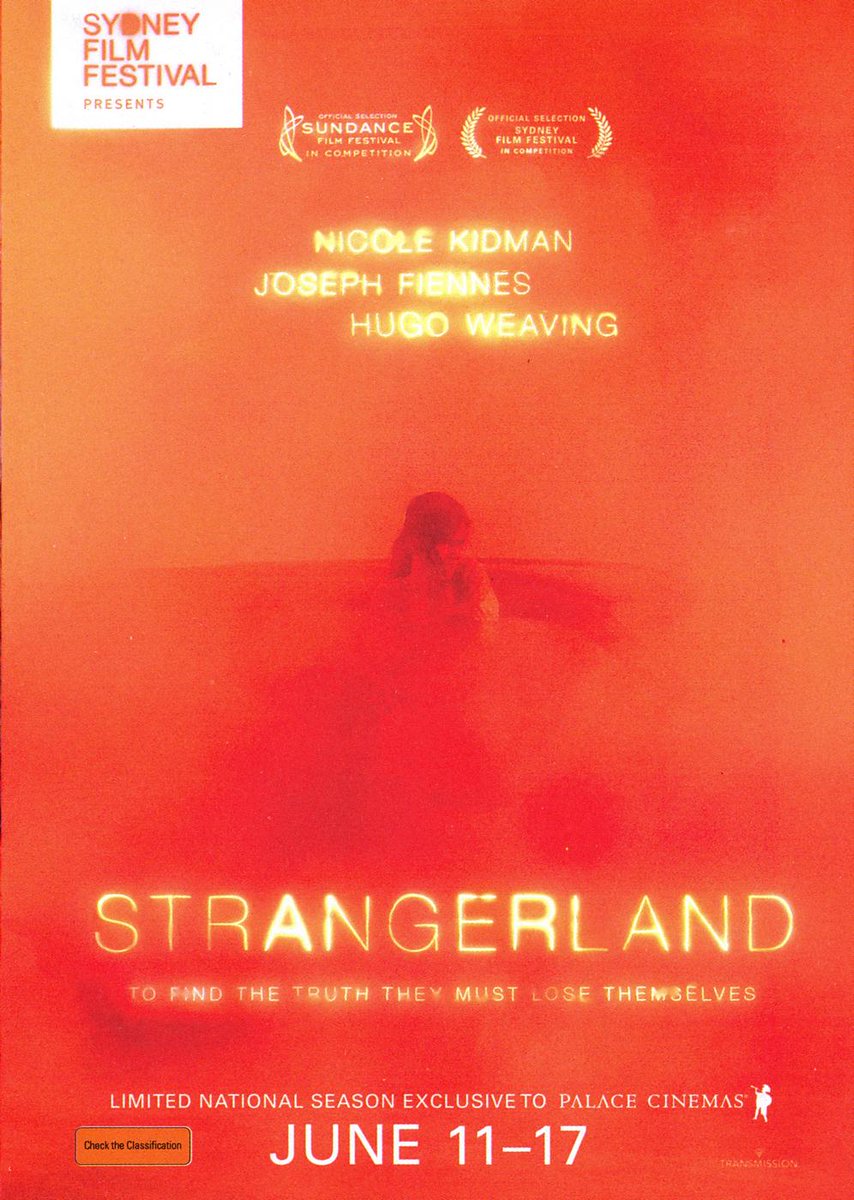
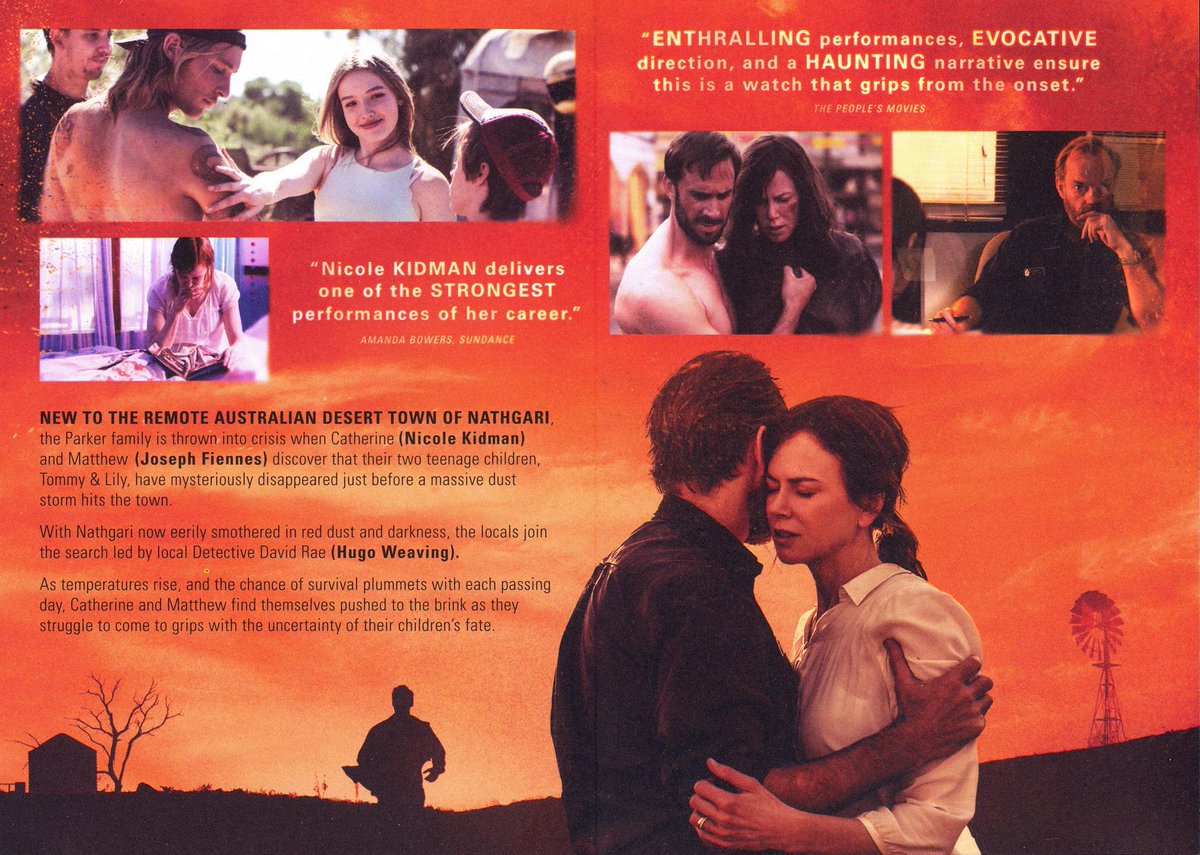
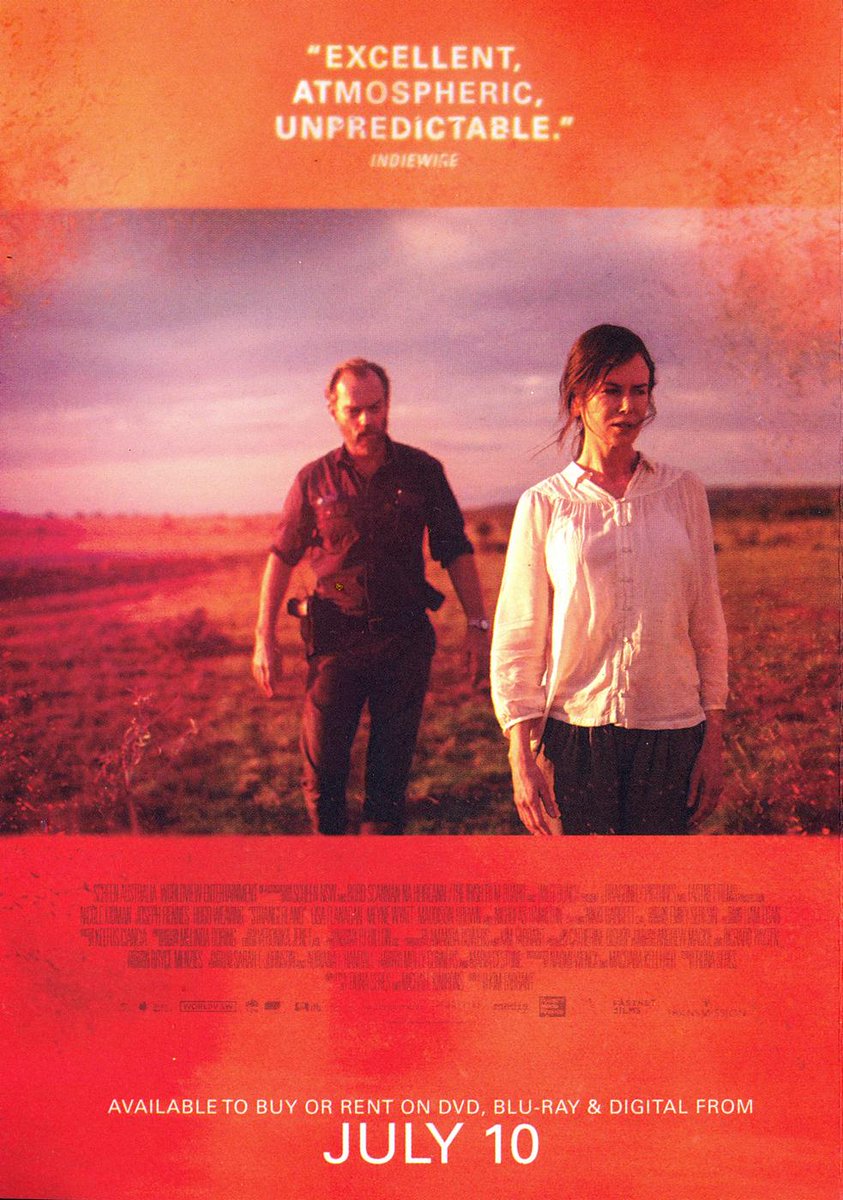
Much larger version here.
Between A Frock and A Hard Place
The new, 21st anniversary documentary about the making of one of Hugo's most important films, The Adventures of Priscilla, Queen of the Desert, aired tonight (June 18) on ABC in Australia. The film features interviews from the cast, including Hugo (you can see a brief but delightful sneak peek below), narration from Terence Stamp and an exploration of the film's cultural impact, and the LGBT rights struggle in Australia that made it possible. There are a lot of wonderful reviews and discussions of the film; you can read a few at The Guardian (includes some trivia about the film), Out In Perth, The Australian, Daily Review/Crikey, news.com.au, and TV Tonight. International viewers never fear, the film will be released on DVD/Blu-Ray early next month. You can order it at JB Hi-Fi but it always pays to shop around. (JB does often have the best price, but not always.) Bear in mind this is a Region 4/PAL presentation, so you'll need the appropriate region-free hardware or player if outside Australia. (The cheapest option is the VLC Player, which is a free download and is my go-to for playing virtually anything my stand-alone player or other software barfs on.)
30 second promo of Hugo Weaving's interview from A Frock and A Hard Place, via ABC-TV, YouTube
Here are some great archival images that have appeared in conjunction with the documentary:
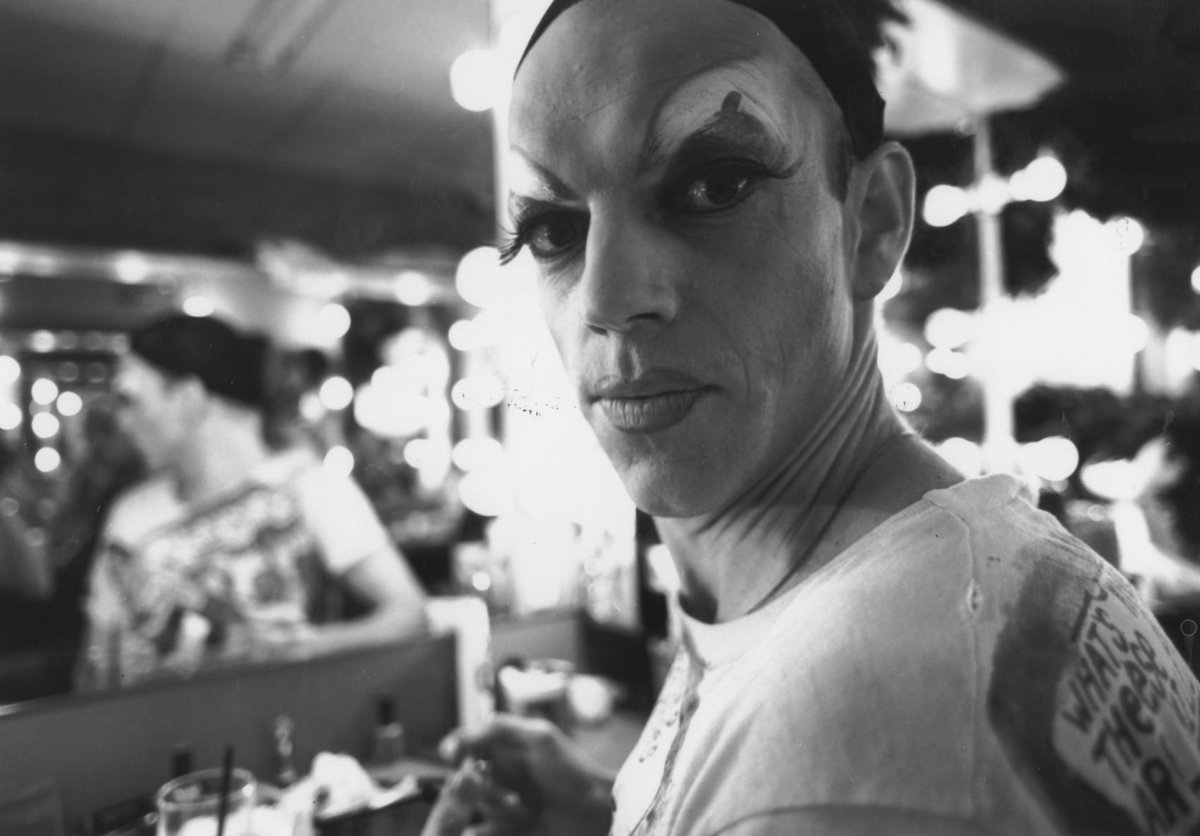
Hugo Weaving discovers Mitzi in the makeup trailer Photo: AACTA via Twitter
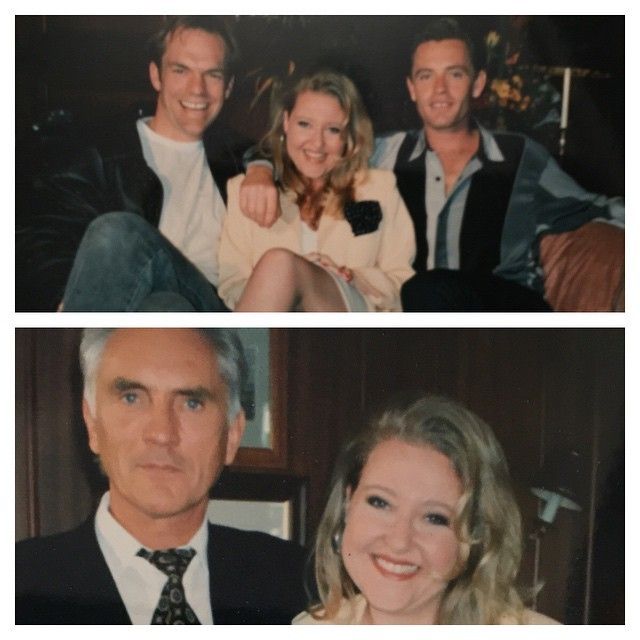
"#throwbackthursday Interviewing Hugo Weaving, Stephan Elliott and Terence Stamp ahead of the release of Priscilla Queen of the Desert, September 1994" Angela Bishop via Instagram; read the rest of her account of interviewing the cast back in the day here.
The Dressmaker
A couple of items on Hugo's late 2015 film The Dressmaker, directed by old friend Jocelyn Moorhouse (Proof) and costarring Kate Winslet, Judy Davis and Liam Hemsworth: producer Sue Maslin and author Rosalie Ham discuss the project with RMIT (The Royal Melbourne Institute of Technology), and Maslin addresses the problem of a lack of women in the film industry at Panorama at syn.org.au.

Richard Roxburgh and Hugo Weaving in Sydney Theatre Co's Waiting For Godot, London Barbican production Photo: Alastair Muir/Rex
Sydney Theatre Company's Waiting For Godot, starring Hugo Weaving, Richard Roxburgh, Philip Quast and Luke Mullins, ended its widely-heralded run at London's Barbican on June 13, but accolades and wonderful new photos (many from fans who attended performances) continue to appear. I'll repost as many as I can here, with links back to original sources in case I've missed anything. In the case of fan photos, I'll include their original captions. Most of the reviews of the production were quoted in my previous entries, but I'll add any new ones between photos; the actors were universally praised, though a few critics found the production didn't completely jibe with their interpretation of Beckett. (Some had a very elitist tone that implied anything which might appeal to a mass audience somehow misinterpreted the playwright's intentions... as if he intended for a play about the existential despair of two tramps to appeal to only wealthy academic poseurs who reflexively quote Aristotle's Poetics.) ;)

Hugo Weaving, Luke Mullins and Richard Roxburgh in #STCGodot Photo: Alastair Muir/Rex (plus next four)



Hugo Weaving, Luke Mullins, Richsrd Roxburgh and Philip Quast

Terry Eastham, Londontheatre1.com: "Going to be really honest now. When I left the opulence of the Barbican’s theatre I was genuinely confused as to what I had just seen. There is no doubting that the production itself is superb. The magnificent Barbican stage seems to be small and very intimate thanks to Andrew Upton’s staging and Nick Schleiper’s excellent lighting of the post-apocalyptic looking set brilliantly created by Zsolt Khell. And the acting itself cannot be faulted. Hugo Weaving and Richard Roxburgh extract every ounce of personality from Vladimir and Estragon, being so comfortable with each other that even the silences between the characters don’t seem forced or wrong but the sort of silence that good friends can have without feeling the need to fill the vacuum with some fatuous comment...
So, nothing to fault on the production but I really wasn’t sure about the ultimate meaning of the play which, I have to say left me feeling frustrated and unfulfilled. Doing some research today, apparently I am not alone in this. Every nuance of the play is open to interpretation by the audience and this really is a show where every single person watching will have their own highly individual view of the message of the show. Heading home, my companions and I came up with separate interpretations involving dead people, blind dates, wormholes through space and a whole host of others...
Ultimately then, “Waiting for Godot” is an amazing production that three hours after the lights first go down will leave you scratching your head and thinking about it for a long, long time to come.
5 Star Rating"
[CJ: Personally, I find ambiguity and "head-scratching" to be a good thing. Thinking about a play over days-- or even years-- keeps it vital in a way that a pro-forma production that can easily be described in a sentence might not. Fairly certain Beckett wasn't thinking about wormholes, though...] ;)

"Hugo Weaving #hugoweaving #waitingforgodot" Momeetsstars, via Instagram

"Not the best photo ever, but I'm happy with it. #stagedooring #hugoweaving #waitingforgodot" Hein, via Instagram

"Waiting for Godot. Utterly moving every single time. And starring Elrond as Vladimir, and Javert as Pozzo? BEYOND WORDS. #WaitingForGodot #theater #London #HugoWeaving" ecaterinaaa via Instagram

"And then it's night once more. Adieuuuuuuu #Vladimir & #Estragon & #Pozzo & #Lucky #STCGodot #STCOnTour" Lauren Dodds via Instsagram/Twitter

"#SamuelBeckett's beautiful #minimal seminal #postmodern #existential and #absurd #play #WaitingforGodot at #Barbican #theater with #HugoWeaving #playdate @daliakra @joe_robots" Elaine via Instagram
Limelight Magazine and Absolute Theatre include more of those Review Roundups.


"HUGO WEAVING!! I'M SHAKING AND CRYING!!!!" Elise via Twitter (both photos)

"#stcontour" Tim McKeough via Instagram

"brilliant and amazing show #hugoweaving #waitingforgodot" Sarah Chen via Instagram

"Met Hugo Weaving and Richard Roxburgh after their incredible performance of Waiting for Godot at the Barbican!" Marcus Higgins via Twitter

"Me and Hugo Weaving, London,💜💜 aftrernoon. Exeptionnel" Sandrine Destraz via Twitter (plus next two photos)


Artist Mark Winter describes his efforts to have Hugo sign two of his sketches featuring the full cast and Hugo solo at ChicanePictures. These are amazing work (see below), probably as good as Nicholas Harding's rehearsal sketches, though of course done without the benefit of Harding's access. ;) I addressed the whole controversy about autographs and why Hugo might sometimes abbreviate his in the extended tangent below, but I do think it all comes down to timing; Hugo regularly waits until the last minute to enter the theatre and often tries to evade autograph seekers entirely when there are large crowds. He also routinely abbreviates when doing group signings (as at Comic Con in 2010-- an event he has said he didn't particularly enjoy-- or film premieres, which he tends to enjoy in inverse proportion to the size of the crowd and the scale of the film. ;) ). I've gotten full signatures when there weren't as many people around; Hugo tends to be more relaxed and willing to converse or pose then.

Sketch, the Godot cast and their autographs. Mark Winter via Twitter

Hugo Weaving as Vladimir in Waiting For Godot plus autograph Mark Winter sketch, via Twitter

"#HugoWeaving I really really really love him.11 flight hours and jay lag is worthy,only because of his play. " Mimo via Twitter, plus next four photos




The Godot cast take curtain calls Photo: Mimo via Twitter

"Samuel Beckett's "Waiting for Godot" #london #theatre #godot #beckett #sydneytheatre #sydney #uk #hugoweaving #richardroxburgh #barbican #amazing" Klara Došlov via Instagram

"Met my hero #hugoweaving while going to see #waitingforgodot " Lowdown via Twitter

"Hugo Weaving and me" Belegilgalad on DeviantArt
There's a wonderful Spanish-language account of seeing Godot and the post-show Q&A at Londres en Espanol complete with some lovely photos (see below); fans who missed out on meeting Hugo or getting an autograph can again take solace in the fact that they were far from alone.

L to R: Luke Mullins, Hugo Weaving, Philip Quast. Richard Roxburgh, moderator and Andrew Upton at Godot cast Q & A 9 June. Photo (plus next 3 photos) Londres en Espanol


Roxburgh and Quast sign for fans

Richard Roxburgh
Godot and the touring production of The Maids (starring Cate Blanchett) are prominently featured in a report on STC's burgeoning profits and renovation plans, at The Sydney Morning Herald. The Daily Telegraph has already included the production on their list of 2015's Best Plays.
Finally, uberfan Rossetton G shared a mother lode of fan photos of the production and cast signings, these are but a few. You can see the full set here or on her Twitter feed.

Hugo Weaving and Richard Roxburgh Godot autographs (original photo: Lisa Tomasetti) This and next photos: Rossetton G via Twitter


Luke Mullins and Philip Quast

Quast (supine) with Hugo Weaving and Richard Roxburgh











Curtain call



Hugo signing after the show

Rossetton with Richard Roxburgh (above) and Luke Mullins (Below)

On a more frustrating note, it seems the situation with professional autograph hounds/sellers and paparazzi interfering with fans' ability to get autographs was as bad or worse in London than it was during the New York run of Uncle Vanya in 2012. While many were lucky enough to have Hugo sign their memorabilia and pose for photos, many others missed out because either Hugo was mobbed by the "pros" en route to the theatre, because he felt overwhelmed or due to time constraints. In Washington DC (Uncle Vanya, 2011) there were security precautions in place to ensure only ticketed theatregoers could approach the stage door. There Hugo and other cast members (with the exception of Cate Blanchett) would often stop and chat with fans and sign or pose for photos. The crowds usually weren't overwhelming and were unfailingly polite. In New York, this setup was impossible and the cast were usually mobbed both en route to and leaving the theatre. Autograph hawkers would present Hugo with STACKS of glossies from The Matrix, LOTR or Captain America and expect him to sign multiple copies which would clearly then be hawked on eBay. I really couldn't blame him (or Cate) for finding alternate exits to the theatre, though this short-changed genuine fans of what in some cases were once-in-a-lifetime opportunities.
Hugo hadn't performed in an STC production in London (or Europe) before Godot, and the run was slightly longer than a week, meaning there would be exponentially many more fans waiting for their opportunity to meet him or have him sign. I wish the theatre had some sensible security measures in place to prevent the "pros" from crowding out real fans, but I understand that sort of thing is logistically difficult. In New York, especially on Broadway, it's impossible, as many stage doors open directly onto main streets/sidewalk; there are usually a few barricades put up, but very little in the way of crowd control, and certainly no way of controlling who has access to the actors, who are often forced to either spend a huge amount of time attending to a vast number of people (many of whom, as I've said, aren't there to see the play), to sign a few autographs for people lucky enough to be in the right place at the right time right next to the security barricades (and short-change many more) or flee to their waiting cars immediately, either as the fans watch or via an alternate exit. None are optimal solutions, and even successfully keeping the "pros" at bay might solve the problem, especially if there are a lot of ticketed theatre-going fans and a limited number of stage door opportunities.
During the 2013-4 run of "The Other Godot" featuring Ian McKellen and Patrick Stewart on Broadway, the actors got out the word that only play-related memorabilia would be signed, and this helped. (I noticed it was a stated policy for this run of Godot as well, though many fans ignored it.) There was also a ban on requests for photos with the actors, though people were free to take photos OF them: my boyfriend took some great photos as I got my autographs.) In that case the stage door opened right onto the street next to the theatre entrance, making it very easy for everyone in the theatre to immediately line up behind the security barricades the moment a performance ended. I was "lucky" enough to have seats near the rear of the orchestra which allowed me to get in place quickly, and was lucky enough to get signed by all four actors. Sir Ian and Billy Crudup (who played Lucky) in particular were astonishingly generous with their time, signing for pretty much everyone who asked. (As far as I know, Crudup might still be dispensing hugs and signatures outside the theatre.)
Patrick Stewart signed a few dozen autographs then quietly disappeared, disappointing many fans. He seemed less comfortable with this aspect of fame, a feeling I know Hugo shares, though he's wonderful and charming to fans when there aren't quite so many of them. Stewart also "shorthanded" his signature into a barely-legible scrawl, something Hugo is doing a variation of (just signing "hugo w", though at least this can be readily made out.) I'm sure this is done to save time when there are huge numbers of fans waiting their turn. I don't think it's anything personal or makes the signature less "valuable"... if you're getting the signature for any other reason that to have a cherished keepsake of an artist you admire (or an event you enjoyed), frankly you're part of the problem. By that I mean I don't know or care whether variant versions of Hugo's signature have different values on eBay or the like. I have always discouraged fans from buying these, as fraud is rampant, and because each legit autograph obtained by a "pro" means one less signed for a fan who actually attended the performance and may have waited years. I do know professional autograph collectors/sellers perversely find inscribed items somehow less valuable, to the extent they'll sometimes hack off an inscription to a fan from an item then slot the signature into a frame with a generic photo. Real fans would of course find an inscribed autograph the most precious keepsake of all.
I've been lucky enough to have Hugo sign for me a few times. I say "lucky" because he's dodged me and others a few times too... though this can be gutting when it happens, I don't blame him in the least. I admire Hugo's modesty and lack of interest in fame for its own sake, so I understand why the notion of signing for dozens of people every night-- a number of whom are just having him sign "marketable items" connected to his most famous roles, for resale-- might give him pause. As fans, we don't have a "right" to autographs. It's a privilege we're sometimes granted, but actors deserve their privacy and space too.
As for what advice I'd have for other seeking autographs, I have a few suggestions, but there are no guarantees; as I keep emphasizing, it all comes down to luck. But it helps to attend more than one performance for a play, as this increases your opportunities to get signed. Try to attend less-busy performance nights (I usually try for a Tuesday) rather than Friday/weekend evenings which will be busier. (This may fluctuate based on a theatre's schedule: most US productions are dark Monday with nightly performances Tuesday through Sunday and matinees Wednesday and Saturday (or Sunday in some cases). Don't expect to get signed on the last night of a performance, as there are often cast parties and celebrities in attendance who'll be granted extended backstage access. Even if an actor leaves via the stage door in these cases, he may well be exhausted. If you're attending on a day with two performances, try for the earlier one for the same reason. but be aware the actors may be pressed for time in either case, and in some cases might not even leave the theatre. Don't breach security, don't approach the actors on their own time (I did once get signed when Hugo was entering the theatre, but I felt a bit dodgy about the whole thing).
If permitted, have him sign something unique which has personal meaning to you, but is NOT connected to his most famous work, ie so he'll know it won't be resold, and that you're aware of his entire career, not just the odd franchise. (I had my loveliest response from Hugo when I had him sign my DVD of Last Ride.) If the venue posts rules about what can be signed, or whether or not actors will pose with you, abide by them. I'm often asked about gifts, but have never tried giving them; in New York in particular security can be strict about that sort of thing. The best anecdotal stories about actors receiving gifts involved handmade or particularly creative/unique items. Finally, allow for the possibility of failure and understand that it's nothing personal. There many actors who've creatively dodged my every attempt to get an autograph (Cate Blanchett springs to mind; she signs sparingly if at all. Many actors have no-autograph policies.) Your emphasis should be on enjoying the work-- the play, film or whatever you're there to see-- rather than on bagging that autograph. And keep trying. It's good to have long-term goals or dreams. I waited over 20 years (and saw many plays) before I got signed by McKellen and Stewart, then got signed by both within 30 seconds of each other, then it was all over. ;) It was as amazing as you'd expect, but you can't harbor dreams of extended conversations or of an artist intuitively understanding just what he's meant to you over all these years.
As always, my eternal gratitude to all the fans who shared their photos and stories. It made for a wonderful vicarious experience for all of us who couldn't be there in person.
Strangerland
Kim Farrant continues to do most of the publicity for Strangerland in its Australian release, and has given many in-depth, thoughtful interviews on her process of making the film, You can hear/read these at SBS (also features three short scenes from the film), ABC Radio Brisbane, Junkee, Community News, Foxtel Screen, Rip It Up, Eff Yeah Feminism podcast, Film Ireland,
The most in-depth discussion of the film is probably a fascinating 35 minute conversation at Ben Mizzi's Screen Director Podcast. The article which gives the most attention to Hugo's contribution is at The Australian. (Print version here.) " 'Knowing him as a person, we both realised this part of him doesn’t get seen on screen,' Farrant says. “Hugo’s often portrayed on screen as this villain, a cold, aloof man and he’s actually very sensual and beautiful and loving and sensitive, so it was: ‘Yes, let’s cast him!’ ”
Farrant discusses her future projects at Inside Film: one hopes she doesn't fall into the trap of so many directors who come to the US either to be treated shabbily (as was Rowan Woods) or downgraded to tedious franchise gigs (too many to count.) Yes, I know the US media considers a director to have only "made it" when they get that Marvel franchise gig (or the equivalent) but I strenuously disagree. ;)
You can hear positive or leaning positive audio reviews at ABC News Breakfast Here are quotes of text reviews with links back to sites of origin:
Glenys, The Ponder Room: "Set in hot outback Australian the imagery is beautiful, think Picnic at Hanging Rock, which Farrant explained was one of her influences...
Strangerland is a slow burn. It explores a mothers anguish, our perceptions of people with diminished mental capabilities, and what happens when secrets are kept. It’s always good to watch Weaving at work and this was no exception. Kidman appears suitably vulnerable as a women suppressing her own demons. The young cast of Maddison Brown, Meyne Wyatt, Sean Keenan and Nicholas Hamilton suggests that the future of Australian film is in good hands."
***
Michael Bodey, The Australian: "Kim Farrant’s Strangerland is a cool whodunit and character study featuring charismatic performances from Nicole Kidman and Hugo Weaving. Joseph Fiennes’s turn as the absent husband is a handbrake on a moody film, though."

Hugo Weaving as David Rae in Strangerland, from the film's press kit
Alex Doenau, Trespass Magazine: "Australia is a big country, with the capacity for many stories. Some of our finest stories have been brought to the screen courtesy of Nicole Kidman, and this time she has swapped BMX Banditry for desolation of the soul. For the most part, it works...
Strangerland is a movie that comes down to its performances, essentially filling in a blank slate of relatively anonymous Australian countryside. The fundamental question of why a family that wanted to avoid attention moved to an area small enough that everyone would be at least familiar with them is never addressed, but Kidman and Fiennes still manage to do well as a troubled couple precisely because they never quite work together...
Kidman’s performance is varied, but in a way that complements the film and the character. Sometimes she seems to be literally sleepwalking in front of the camera, and that actually suits the themes of the film, which she has to shoulder herself... The other standout is Weaving, continuing his streak of well-chosen character roles in Australian films. The most rounded and approachable character, Weaving is also the touchstone for the film’s barely explored racial issues, which largely manifest as obvious red herrings...
A stirring portrait of a couple that should possibly have never been together, Strangerland is an uncomfortable experience that works because of its scattered pieces not quite fitting. A daring debut that hypnotises as it obscures its core truths, and proof once more that Nicole Kidman is an asset to any country’s film industry."
***
Cara Nash, FilmInk: "There’s no doubting that Farrant has a gift for mood, building a sense of dread, isolation and gaping sadness that threatens to swallow everyone whole. Strangerland is a challenging watch, but it’s also wholly compelling, and that’s largely owing to the superb performances across the board. Kidman is in fearless form as Catherine, a woman wracked with pain, guilt, self-doubt and a desperate need for connection - whether that be with her emotionally cold husband, the town’s empathetic cop or her wayward daughter, who she questions how much she is like. As always, Weaving is solid as an inherently decent cop trying to navigate his way through increasingly complex moral territory, while one feels Fiennes’ Matthew may implode because of all the repressed rage he’s carrying around...
The idea that the Australian outback is a dangerous and unknowable landscape is one that has populated many a local film, and while Farrant introduces ideas about the spiritual connection to the land of indigenous people, these ideas are never fully fleshed out. The filmmaker, however, bravely refuses to offer any type of closure - which is fitting given the many heartbreaking, haunting questions her central protagonists are left to live with. "

Hugo Weaving, Joseph Fiennes and Nicole Kidman
Glen Falkenstein, Film Ireland: "Farrant’s focus on Catherine’s feelings of grief and hopelessness drove much of Strangerland, resulting in an eerie, disquieting and all-round consuming tale of two estranged parents coping with the loss of their children. The performances from Weaving and Kidman in particular were practiced and immediately impactful. As the characters steepen into fear, panic and at times hysteria, the very visceral racial and sexual tensions between the characters came to the forefront, resulting in several tense and confronting sequences. No small part of the film, the relationship of both Indigenous Australians and the recent arrivals to the land played a crucial role, driving much of the dramatic tension."
***
Andrew Nette, Pulp Curry: "What makes Strangerland innovative is its portrayal of female sexuality, both Lily’s and her mother, Catherine’s, which is unflinchingly rendered and is something you won’t see very often because of the hot button issues it touches on. As part of this, Farrant puts a new spin on the how the parents deal with their grief over the missing children. This involves her examining a shadow side of female emotion that is seldom talked about, let alone put on the screen...
Strangerland also excels in depicting the sense of frustration and desperation faced by the parents and the police at the prospect of having to search for two missing children amid the huge expanse of inhospitable countryside. The way the camera pans and sweeps over the desert and gorges is both beautiful and terrifying. Farrant is also to be congratulated for eschewing an easy plot resolution in favour of something much darker."
***
Glenn Dunks, Writing: "Kim Farrant’s Strangerland is deeply, uncomfortably Australian. In many ways, it goes right to the heart of the country as a family infiltrate a place that is unfamiliar and even hostile to their arrival. A family, all of whom hold secrets and potentially criminal pasts. They could have been dressed up in Colonial costumes and set 150 years ago without much of a narrative alteration, which is probably much the point of Farrant’s debut feature. How our convict pasts have manifested as a society that turns on its own as much as the other...
Most of all, however, Strangerland reminded me most of all of the early features of Peter Weir. The aura of Picnic at Hanging Rock’s lingering natural menace mingled with repressed teenage female sexual awakening hovers heavily over this new film albeit in a more narrative-focused way. Weir’s The Last Wave, a film that has challenging ideas over the role that one of Earth’s oldest civilization and their subsequent genocidal mistreatment might play in our way of life, is also evoked although Farrant doesn’t go quite to the extent of that film’s chilling, apocalyptic ending...
Despite the power of that particular scene and the performance of Kidman that crescendos in the dying sunset of the film’s final passages, Strangerland’s final act is still somewhat bungled in terms of its pacing. Hardly a new issue with Australian film as Farrant is clearly trying to leave a lasting impression of mood rather than a satisfying narrative conclusion, although the promise of the previously raised concept of mysticism isn’t fully delivered upon either. Likewise, the character of Lily is clearly one that we’ve seen before, most prominently in Rachel Ward’s Beautiful Kate (this could almost be a sequel), although her naff teen poetry is comically on point (“Their marriage is a farce / such a pain in the arse”, for instance). Still, I found so much to admire in the glowing, dusty cinematography of P.J. Dillon, Keefus Ciancia’s haunting music and the performances of Kidman, Hugo Weaving and Lisa Flanagan that I didn’t mind much at all. I was deeply impressed by Strangerland and likely for many of the reasons that others have not."

Alternate poster for the film's Australian release
Bernadette Pierce, The A and B Film Podcast: "Many critical reviews of Strangerland cite a lack of focus and believable character development and while watching the film I too found myself longing for certain aspects of the story to be focused on in lieu of another story that invokes the dangers, mysticism’s and history of the Australian outback. Reviews have also been critical of the ‘distracting sexuality’ in the film, Farrant has stated that she wanted to look at ways that people deal with extreme emotions, in particular those who use sex as a way of dealing with those emotions. The Parker women use that primal desire and act to cope with varying degrees of apathy, loneliness and for Kidman’s Catherine - the fear and grief she feels regarding her missing children and as the film progresses, her uncertainty about her husband. Perhaps how you respond to these character actions will depend on your own life experiences and propensity to use irrational or even self-harming coping mechanisms. I found the portrayal of sexuality in the film to be interesting, unsettling and honest."
***
I've added the full Strangerland press kit and a couple of stills featuring Hugo to my Flickr Hugo Weaving Archive. And here are my scans of a Sydney Film Fest brochure:



Much larger version here.
Between A Frock and A Hard Place
The new, 21st anniversary documentary about the making of one of Hugo's most important films, The Adventures of Priscilla, Queen of the Desert, aired tonight (June 18) on ABC in Australia. The film features interviews from the cast, including Hugo (you can see a brief but delightful sneak peek below), narration from Terence Stamp and an exploration of the film's cultural impact, and the LGBT rights struggle in Australia that made it possible. There are a lot of wonderful reviews and discussions of the film; you can read a few at The Guardian (includes some trivia about the film), Out In Perth, The Australian, Daily Review/Crikey, news.com.au, and TV Tonight. International viewers never fear, the film will be released on DVD/Blu-Ray early next month. You can order it at JB Hi-Fi but it always pays to shop around. (JB does often have the best price, but not always.) Bear in mind this is a Region 4/PAL presentation, so you'll need the appropriate region-free hardware or player if outside Australia. (The cheapest option is the VLC Player, which is a free download and is my go-to for playing virtually anything my stand-alone player or other software barfs on.)
30 second promo of Hugo Weaving's interview from A Frock and A Hard Place, via ABC-TV, YouTube
Here are some great archival images that have appeared in conjunction with the documentary:

Hugo Weaving discovers Mitzi in the makeup trailer Photo: AACTA via Twitter

"#throwbackthursday Interviewing Hugo Weaving, Stephan Elliott and Terence Stamp ahead of the release of Priscilla Queen of the Desert, September 1994" Angela Bishop via Instagram; read the rest of her account of interviewing the cast back in the day here.
The Dressmaker
A couple of items on Hugo's late 2015 film The Dressmaker, directed by old friend Jocelyn Moorhouse (Proof) and costarring Kate Winslet, Judy Davis and Liam Hemsworth: producer Sue Maslin and author Rosalie Ham discuss the project with RMIT (The Royal Melbourne Institute of Technology), and Maslin addresses the problem of a lack of women in the film industry at Panorama at syn.org.au.